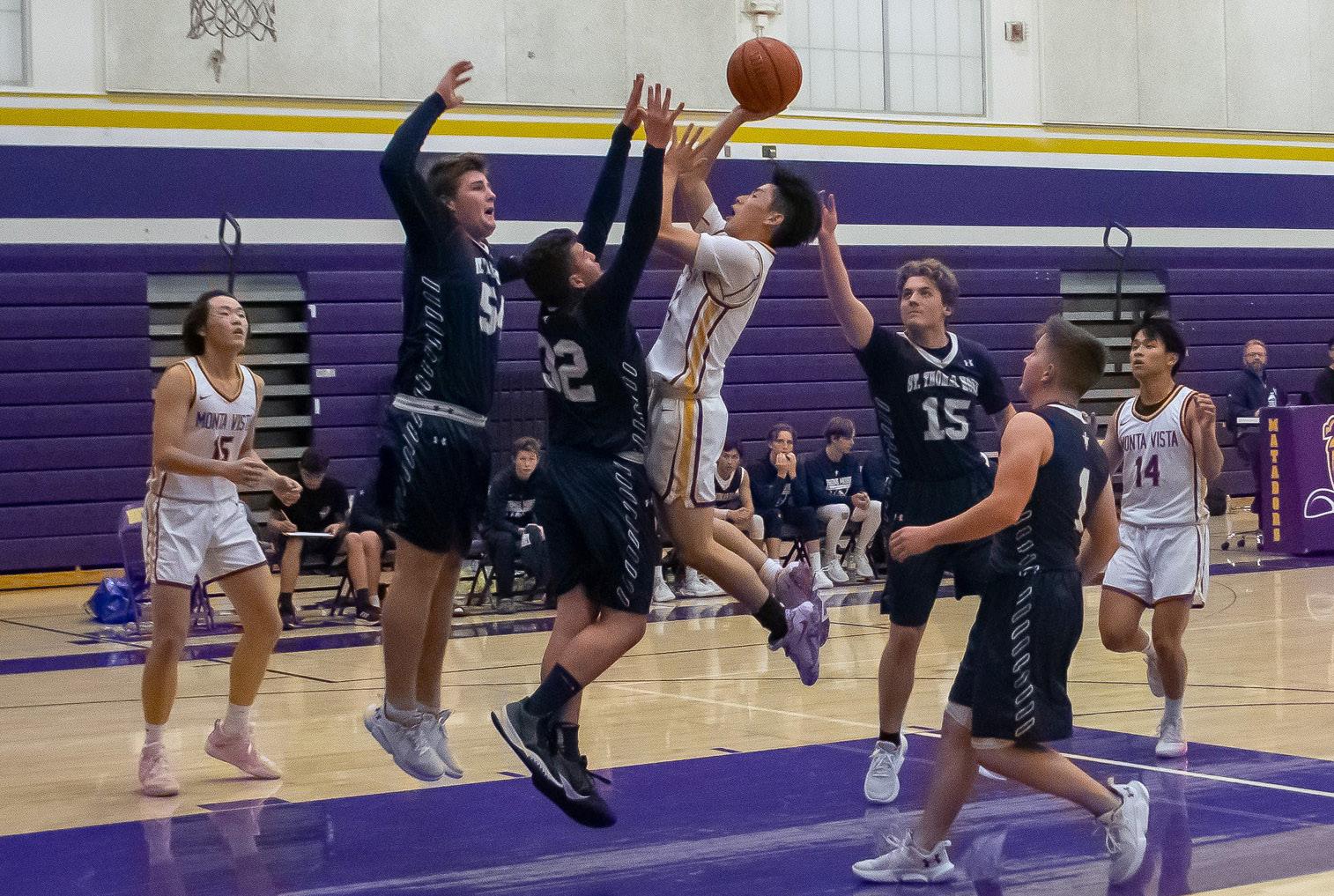
21840 McClellan Rd, Cupertino, CA 95014 elestoque.org mv.el.estoque@gmail.com


21840 McClellan Rd, Cupertino, CA 95014 elestoque.org mv.el.estoque@gmail.com


Editors-in-Chief: Krish Dev, Anna Jerolimov
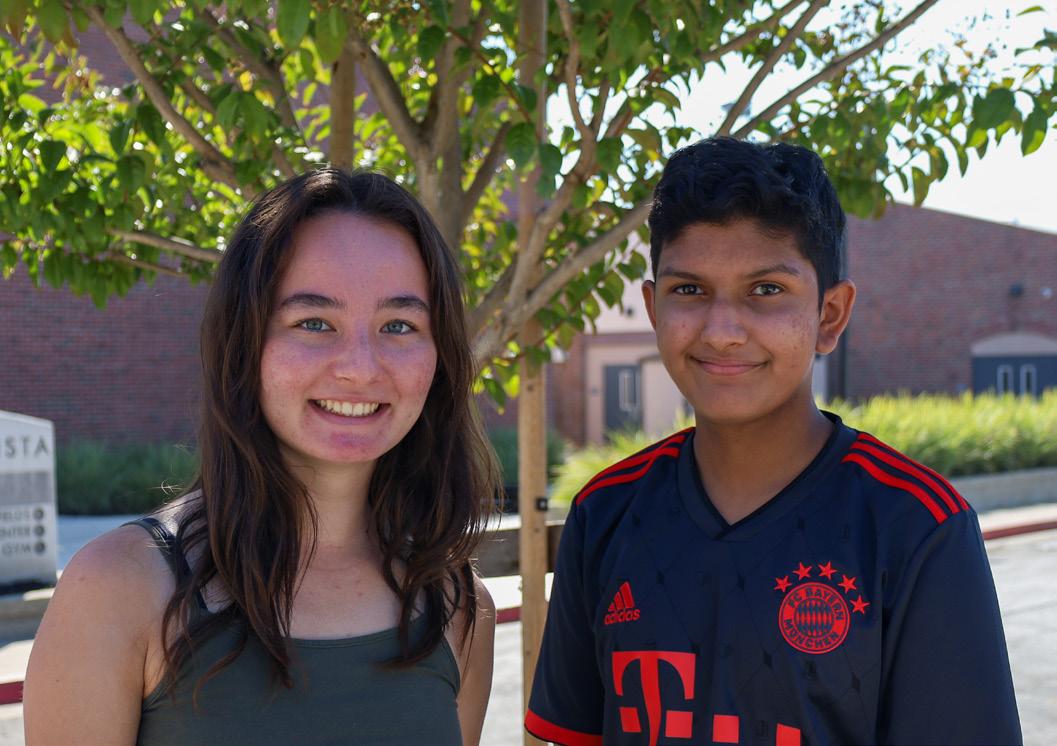
Managing Editors: Melody Cui, Gauri Manoj, Kripa Mayureshwar, Mira Wagner Design Editors: Mikaylah Du, Sophia Ma Graphics Editor: Sonia Verma Copy Editors: Minjae Kang, April Wang, Brandon Xu Website Editors: Yash Thapiyal, Vincent Zhao Visuals Editor: Aditya Shukla News Editors: Lauren Chuu, Mihir Vishwarupe, Lillian Wang, Angela Zhang Feature Editors: Taryn Lam, Aashna Patel, Irene Tang, Stephanie Zhang Opinion Editors: Meggie Chen, Tvisha Gupta, Sarah Liu, Jisha Rajala
Entertainment Editors: Nameek Chowdhury, Avni Gandhi, Jiya Singh, Aashi Venkat Sports Editors: Crystal Cheng, Kathryn Foo, Kalyani Puthenpurayil, Michelle Zheng Staff Writers: Chiran Arumugam, Anika Bhandarkar, Samika Bhatkar, Ananya Chaudhary, Sagnik Nag Chowdhury, Jason Chu, Abha Dash, Arjun Dhruv, Lily Jiang, Pranati Kotamraju, Manas Kottakota, Jami Lim, Sameer Maheshwari, Megha Mummaneni, Riya Murthy, Aidan Ruan, Trisha Sannappanavar, Dahlia Schilling, Darpan Singh, Alan Tai, Eshika Tiwari, Anabelle Walker, Alyssa Yang, Alex Zhang, Eric Zhou Adviser: Julia Satterthwaite, MJE
Mission Statement: El Estoque will accurately inform our community through well-researched, unbiased and in-depth accounts of the student body and staff, news and developments and taboo topics prevalent in and near MVHS. Investigating various voices and credible perspectives, we hope to foster active discussion, effect positive change and spread awareness of timely, relevant content. As a trustworthy and reliable source of information, we strive to be accountable, adaptable and ready to correct and address our mistakes. Constantly striving for improvement, we will uphold integrity and ethics to be respectful and empathetic to our sources and our readers. We will exercise our press freedoms guaranteed by the First Amendment and California Ed Code 48907 while maintaining a community passionate about our work and journalism as a whole.
As we share our personalized Spotify Wrapped summaries with friends — our most played artists, music listening personalities and minutes far too high to count — we are reminded of the role music plays in our lives. From giving us motivation as we try to scramble words together for essays, to acting as a friend when we deal with heartbreak and being the soundtrack to late night drives to In-N-Out, our playlists helped us navigate the chaotic year.
Music is a welcomed constant in our lives, offering stability in an ever-changing world with turbulent news cycles that have overrun social media. With Russia’s invasion of Ukraine in February, the unexpected overturning of Roe v. Wade in June and the close-fought midterm elections, 2022 has been intense.
While it’s easy to get lost in the midst of endless negative headlines that are optimized to dominate our feeds, we also need to recognize good news, especially in our community.
The recent passing of Proposition 28 ensures more funding for our music and arts programs, allowing the musicians and artists at MVHS access to better resources and facilities. Our fall sports teams, often underappreciated in the academicfocused environment of MVHS, achieved record-breaking success in the past few months. Girls Tennis made a Cinderella run to win the CCS Championships from seventh seed, Varsity Football was able to take back the Helmet Trophy after six years and Girls Volleyball matched last season’s record-breaking season with a second round appearance in NorCal playoffs.
Going into 2023, let’s make it a New Year’s resolution to seek out good news and appreciate the success surrounding us. And even though there will be bumps in the road, having a positive mindset will help us keep our heads high. And don’t forget, we can always rely on our favorite songs to help us as we push through challenges.
Anna Jerolimov Krish Dev COVER GRAPHIC | MELODY CUI AND GAURI MANOJ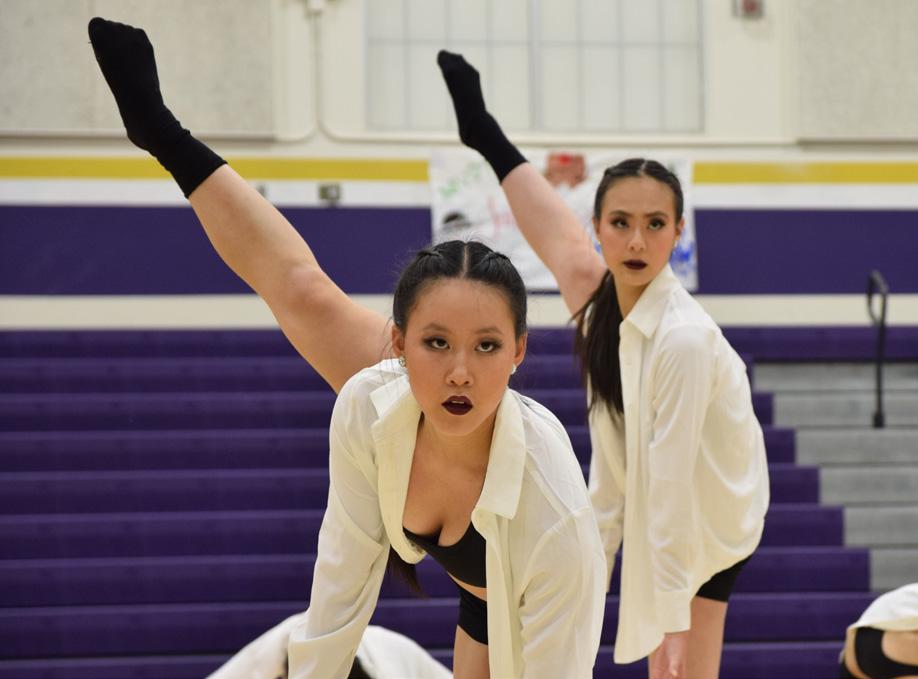

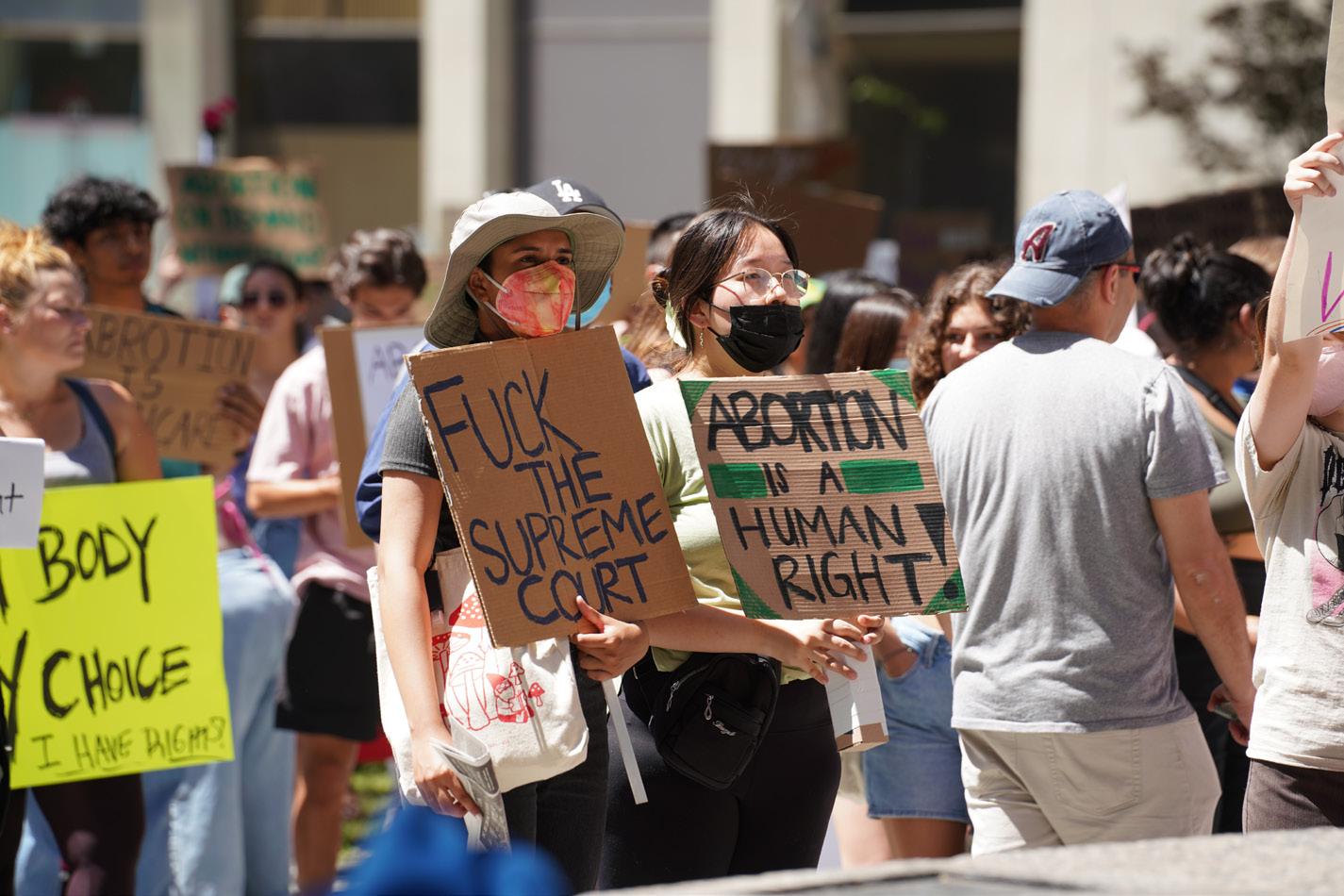
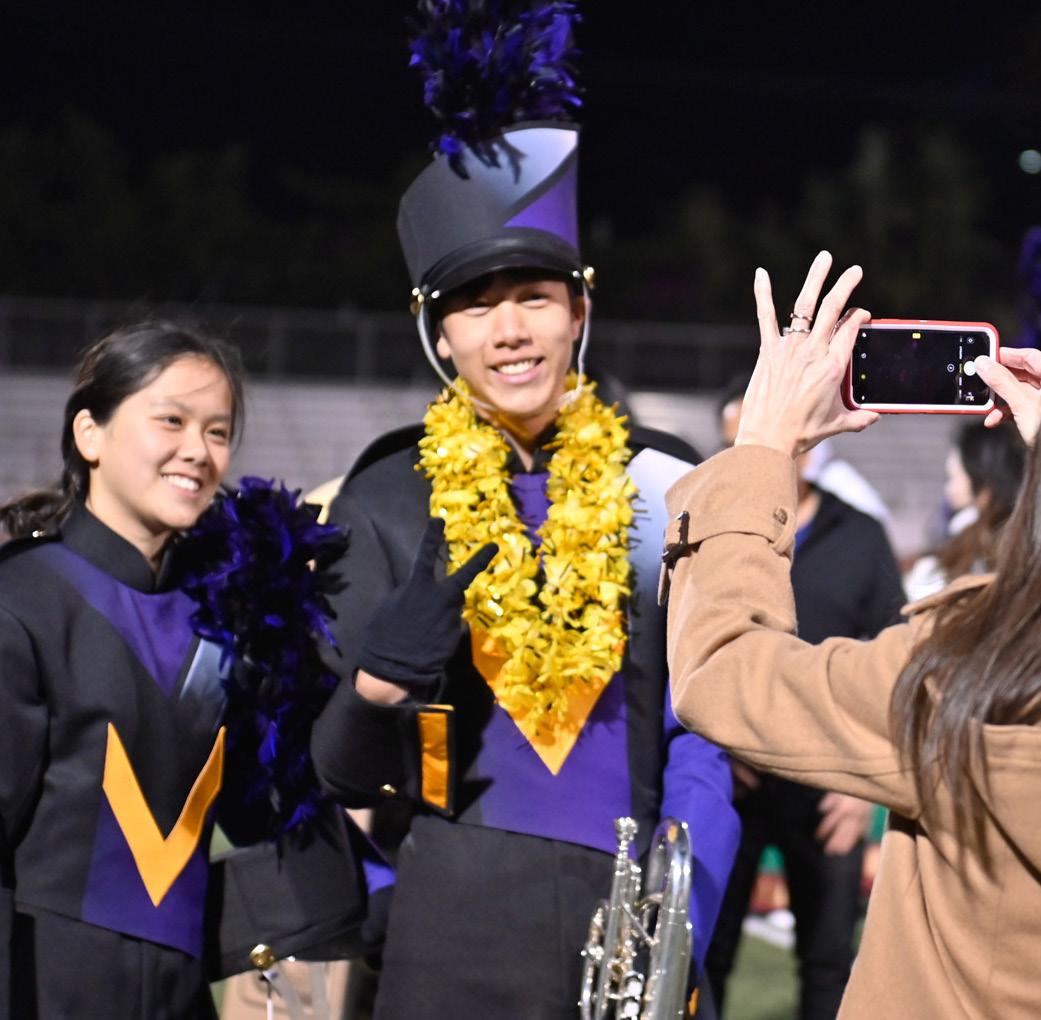
Test your knowledge of key events last month

 BY KRISH DEV AND LILLIAN WANG
BY KRISH DEV AND LILLIAN WANG

Which congress person won reelection in the CA-17 election?

Which Middle Eastern country became the first host to lose its opening match in World Cup history?
Which Varsity Girls team won the CCS Championships, going from seventh to the first ranked team?
Who was the leading Republican candidate during the California recall election?
Varsity Football defeated which high school to bring back the Helmet trophy after six years?

What was the name of the Marching Band and Color Guard show, performed at home on Nov. 15?
China 4


“White Paper Protests” are in response to which Chinese Communist Party policy?
Who was the leading Republican candidate during the California recall election?
Which state’s Senate seat was flipped by John Fetterman in the 2022 midterms?

LGBTQ 8

Which bill protecting interracial and gay marriage was passed by the Senate on Nov. 29?
Drama 9
Who was the leading Republican candidate during the California recall election?
What is the name of the magical material that Peter uses to fly in “Peter and the Starcatcher”?

Layoffs
Which parent company of Facebook and Instagram laid off over 11,000 employees?




 BY SOPHIA MA AND AIDAN RUAN
BY SOPHIA MA AND AIDAN RUAN
California Proposition 28, a measure designated to allocate funding for art programs across K-12 California public schools, was passed on Nov. 8 with 64.4% of voters in favor. Starting in 2023, the proposition requires the state to allocate a percentage of funds — around $1 billion — specifically for music and art programs.
Band and Orchestra Director John Gilchrist believes Proposition 28 is promising for the future of California arts education. Although the music department receives a $10,000 purchase order from the school to cover instrument repair and sheet music costs, an additional $200,000 is required to fully run the various programs offered — band, orchestra, choir and specialty programs such as Marching Band, Winter Guard and Winter Percussion. This budget is currently covered by the families and donors in the Monta Vista Music Boosters.
Gilchrist hopes Prop 28 will provide the needed funds for additional coaches, instrument upgrades and building renovations. According to Gilchrist, many of the instruments
and facilities are over 60 years old and have become unsuitable for an orchestra of their caliber.


“A lot of our programs [are] fighting for facilities,” Gilchrist said. “I’m hoping [the] money can help [us] expand our facilities and give us a chance to actually meet some of those program needs.”
Likewise, junior and Drama student Rae Bayer hopes the funds will be used to renovate the two-story loft in the Black Box, which is used to store costumes. Currently the loft is unfurnished, with exposed concrete and pipes, and uneven steps that range from two inches tall to five. They explain that their mother, the department’s costume maker, received a concussion after falling from the stairs.
“There are tripping hazards and [if you trip] you risk hitting your head on a concrete block or the tiled floor or the pipes,” Bayer said. “‘Baby-proofing’ the loft so that it’s safer needs to happen.”

While many facilities within the arts programs need remodeling or updating, Engineering and Woodshop teacher Ted Shinta believes that the
changes can come with risks and hurdles, citing an instance where they had to store equipment in a shipping container during the F building renovations.
“On hot days, [the container] would heat up and get super hot, but on cold days the air [would] condense the water and get the inside all wet,” Shinta said. “So we don’t have that equipment anymore — [it was] just destroyed, and [the] Robotics equipment actually got stolen.”

Despite the alluring terms of the proposition, Gilchrist worries the funds might be spent on superficial upgrades such as improved lighting and a new coat of paint rather than structural changes the programs need. Although MVHS art programs face various challenges, Gilchrist hopes that art programs in California will be valued just as much as in other states.
“A lot of the time, arts education is not given priority because it’s seen as more of a hobby than [a] profession,” Gilchrist said. “A lot of other [states] in the country have figured out art is an important part of people’s lives. We’re not at that stage yet, but I’m hoping that we get there.”

Meta and Twitter — along with several other tech companies — announced the layoffs of thousands of employees this November, citing concerns about less income and the possibility of a recession. As part of mass nationwide layoffs, tech companies in the Bay Area have laid off over 43,000 employees since November.
An additional contributor to the layoffs was the boom in employment across tech companies. Meta CEO Mark Zuckerburg explained a key factor for the layoffs was the necessity to lower the budget spending of the company after the significant growth of new employees during the pandemic. Similarly, following Twitter CEO Elon Musk’s acquisition of Twitter for $44 billion, Musk laid off 50% of Twitter’s employees.
AP Economics teacher Scott Victorine was not surprised when he first heard about the layoffs and says they are “nothing new” and “something that you can see in cycles,” citing past layoffs during the Great Recession in 2008. Although the layoffs help decrease company expenditure, Victorine sympathizes with those who have lost their jobs.
Victorine’s sentiment, mentioning he “[doesn’t] take [being laid off ] personally in any way.” Reflecting on his three years at Meta, Bond says he enjoyed working there as a member of the Risk and Response team.
“I really enjoyed the culture of the company,” Bond said. “And most importantly, I just really loved my coworkers because I was fortunate to be working with extremely talented individuals and learning every day. Even though I’ve been in [the] industry for a long time, every day was a learning opportunity to draw on everybody’s strengths.”
Despite the sudden layoff notice putting his future in question, Bond also looks forward to new opportunities. Moreover, Bond believes that this experience has shaped his outlook on the future of his professional career.
“I’m looking at a wide variety [of opportunities] from the private sector to the public sector,” Bond said. “Everything is on the table at this point. Even relocation [is possible], so it’s really adventurous when you think [about it, even if] it is a bit tedious.”
“I feel bad for those people and their families, but in terms of business, productivity and efficiency, if [the layoffs improve] the business model, that could potentially cut costs for consumers [during inflation].”
believe that the layo s will be detrimental to companies
*According to a survey of 134 people
Bond says going forward, the layoffs will open up new doors for the future of his career — however, he will need to consider his family.
“It’s not about me,” Bond said. “It’s about my family.”
Brandon Bond, a local resident who was recently laid off from Meta, echoes
Victorine anticipates additional Meta layoffs in the future due to Zuckerberg’s continuous push to fund projects geared toward the creation of the Metaverse — the future online world that allows distant people to see each other virtually and interact. Pointing specifically to projects
regarding the Metaverse, Victorine believes Zuckerberg has too much control over Meta.
“The layoffs are largely driven by the fact that Mark Zuckerberg is gambling on the Metaverse, and it’s costing him a lot of money,” Victorine said. “If he didn’t have so much control over the company, there’s a very good chance he could be out, or he could be in a different position at this point.”
Akash Gupta, an MVHS parent and Director of Product Management for AI and Machine Learning at the software company ServiceNow, believes companies should find solutions to financial issues rather than laying off their employees.
a company is going bankrupt or if a company cannot sustain [itself].”
Victorine disagrees with Gupta that layoffs should be the fallback option for companies — calling Gupta’s ideas “vague” — especially because not laying off employees can result in an “overall increase in the cost of products and services” for consumers.
there are two sides to layoffs — while they negatively impact laid off workers, they can also benefit a company’s output.
“It’ll be unfortunate that so many people have to lose their jobs in the process, but from that [there’s] the potential for greater growth and greater innovation,” Victorine said. “Companies will start [hiring more employees] again as the demand increases, and the market takes off again.”

“A fundamental principle of capitalism is that companies are always going to act
“I never feel that [companies] should lay off people,” Gupta said. “I always feel that [they] should manage people. To me, layoffs should be the absolute, absolute last resort when
[in] their own self interest, but when they do so, it’s [also] for the benefit of [the consumers],” Victorine said. “Because if [a company’s] self interest does not align with the market or with what the market wants, no one’s gonna buy your product, [and] you’re not going to be in business all that long.”
In the long run, Victorine says that
The Omicron variant of COVID-19 surged in January with a record high of 1.5 million cases reported on a single day in the United States. Because of its ability to evade immunity from past infections and vaccinations, the Omicron variant spread quicker and more easily. Due to this unprecedented rate of transmission, there were more than 150,000 COVID-19 related hospitalizations in January, putting a strain on the healthcare

Florida governor Ron DeSantis signed the “Parental Rights in Education” bill, which was famously dubbed the “Don’t Say Gay” bill, on Mar. 28. The legislation prohibits classroom discussion of sexual orientation or gender identity from kindergarten to third grade. Supporters of the bill argue that it gives parents control over their children’s education on LGBTQ+ topics, while opponents condemn the bill as an attempt to erase “LGBTQ identity, history and culture.”

Nineteen children and two adults were killed by a gunman on May 24 at Robb Elementary School located in Uvalde, Texas, the deadliest school shooting in a decade in the U.S. Although 376 police officers arrived on the scene, it took law enforcement one hour and 14 minutes to end the massacre as a result of “systemic failures and egregious poor decision making,” according to the Texas House Committee.


Russia invaded Ukraine on Feb. 24 following an announcement by Vladimir Putin about Russia’s intention to conduct a “special military operation” in the country. Since the start of the war, tens of thousands of people have lost their lives and millions of Ukrainians have been displaced. Around the world, gas prices spiked at record levels as a result of the conflict.
After becoming Twitter’s largest shareholder on April 4, Elon Musk made an offer to buy the company for 44 billion dollars on April 13. Following Musk’s attempt to back out of the deal and an ensuing lawsuit by Twitter in July, Musk ultimately completed the $44 billion acquisition on Oct. 27. Immediately following his takeover, Musk laid off over 50% of Twitter’s workforce.

The Supreme Court overturned Roe v. Wade on June 24, reversing the case that had made access to abortion a federal right since 1973. The decision allowed individual states to decide whether or not to ban abortion. As of December, at least 17 states have made abortion illegal or severely restricted.



Queen Elizabeth II died at age 96 due to health conditions related to old age on Sept. 8. She was the United Kingdom’s longest-serving monarch, with a reign of 70 years. After her death, her son Charles III became the new monarch of the United Kingdom.
On Nov. 8, election offices opened across the United States for voters to cast their ballots in the 2022 midterm elections. Republicans took control of the House of Representatives with 220 seats, while Democrats maintained control over the Senate by securing 51 seats. Some of the major issues on the ballot included inflation, abortion, political extremism and crime.

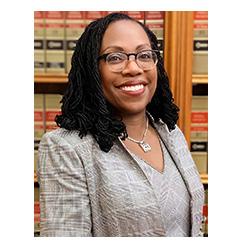

House Speaker Nancy Pelosi visited Taiwan on Aug. 2, the first time in 30 years a U.S. politician of her rank had stepped foot in the country. Shortly after her arrival, China announced live military exercises near Taiwan in retaliation. While Pelosi stated that she believed it was “important to show support to Taiwan,” Biden upheld the U.S.’s commitment to the “One China” policy, which recognizes Taiwan as part of China.
Protests erupted in Iran after 21-year-old Mahsa Amini died in the custody of the Iran morality police. Throughout October, the Iranian government’s crackdown on the protestors intensified, with over 400 deaths by December. Demonstrators protested against Iran’s restrictions on women’s rights and called for the end of the Islamic Republic.
From Nov. 20 to Dec. 18, FIFA hosted the 2022 World Cup in Qatar. Controversies arose about the selection of Qatar as the host country due to allegations of corruption and Qatar’s history of human rights abuses. Additionally, after the captains of seven European teams wore rainbow armbands in support of the LGBTQ+ community, FIFA threatened to place sanctions, leading the captains to stop wearing them.

In recent years, declining enrollment has been a pressing issue for FUHSD schools, especially MVHS, which has been losing students every year since 2006 and currently has a population of 1,743 students, the second lowest in the district. To address this issue, FUHSD formed the district-wide Citizens Advisory Committee. After drafting multiple proposals for an outreach program targeting students from neighboring areas to enroll at MVHS, the FUHSD Board passed the committee’s proposal on Dec. 6 to bring 30 freshman every year from the Homestead High School attendance area to MVHS for the 2023-2024 school year.
Assistant Principal Janice Chen says MVHS hopes to emulate Lynbrook High School, which implemented the Lynbrook Supplemental School Assignment Plan in 2016 to enroll about
90 students anually outside of its attendance area after a record low of 1,766 students.
“They're able to boost their numbers,” Chen said. “We're taking tips from Lynbrook as we're learning what they've done and how they've advertised.”
One of the potential ways the district may try to convince prospective HHS students is by highlighting programs at MVHS. Eighth grader and future HHS student Kevin Yap is not planning to attend MVHS because it’s far away from where he lives. However, he says he might consider going if MVHS advertises that it has classes not o ered at other schools.
“[If it has] a super good class that I'm really interested in, then I might go if no other schools have it,” Yap said.
Chen says MVHS plans to start advertising to families in the HHS attendance area and host an informational night for those interested at MVHS in January. She also says there could be a program to allow
prospective students to shadow an MVHS student for a day to get a feel for the campus. With the application for prospective students closing in early February to allow time for course selection, Chen believes it is essential MVHS does not compare schools when pitching the program.
“[The advertising will be] more about highlighting Monta Vista,” Chen said. “If families feel like this school is a better fit for their student, they should make that choice for themselves.”
Economics teacher Pete Pelkey, who previously taught at HHS, says he doubts students from the HHS attendance area will want to go to MVHS because of the intense academic environment and lack of school spirit at MVHS as well as a desire to stay in the same social groups.
“[If I was a student], I would think it would be better to be over there [at HHS] with my friends,” Pelkey said. “That would be the hard part for the student. Is there an adjustment coming over here [to MVHS]? Absolutely, there's adjustment coming.”
Ultimately, while Chen feels the program is only a temporary fix, she hopes the initiative allows MVHS to pursue other, more longterm solutions in the future.
“I think it would be cool to be able to get 30 students here and kind of see how it goes,” Chen said. “I think it's important for us to be open to adapting [and] trying di erent things as we [face] declining [enrollment].”

 BY ANIKA BHANDARKAR, MELODY CUI , MEGHA MUMMANENI, IRENE TANG, ANABELLE WALKER, STEPHANIE ZHANG AND VINCENT ZHAO
BY ANIKA BHANDARKAR, MELODY CUI , MEGHA MUMMANENI, IRENE TANG, ANABELLE WALKER, STEPHANIE ZHANG AND VINCENT ZHAO
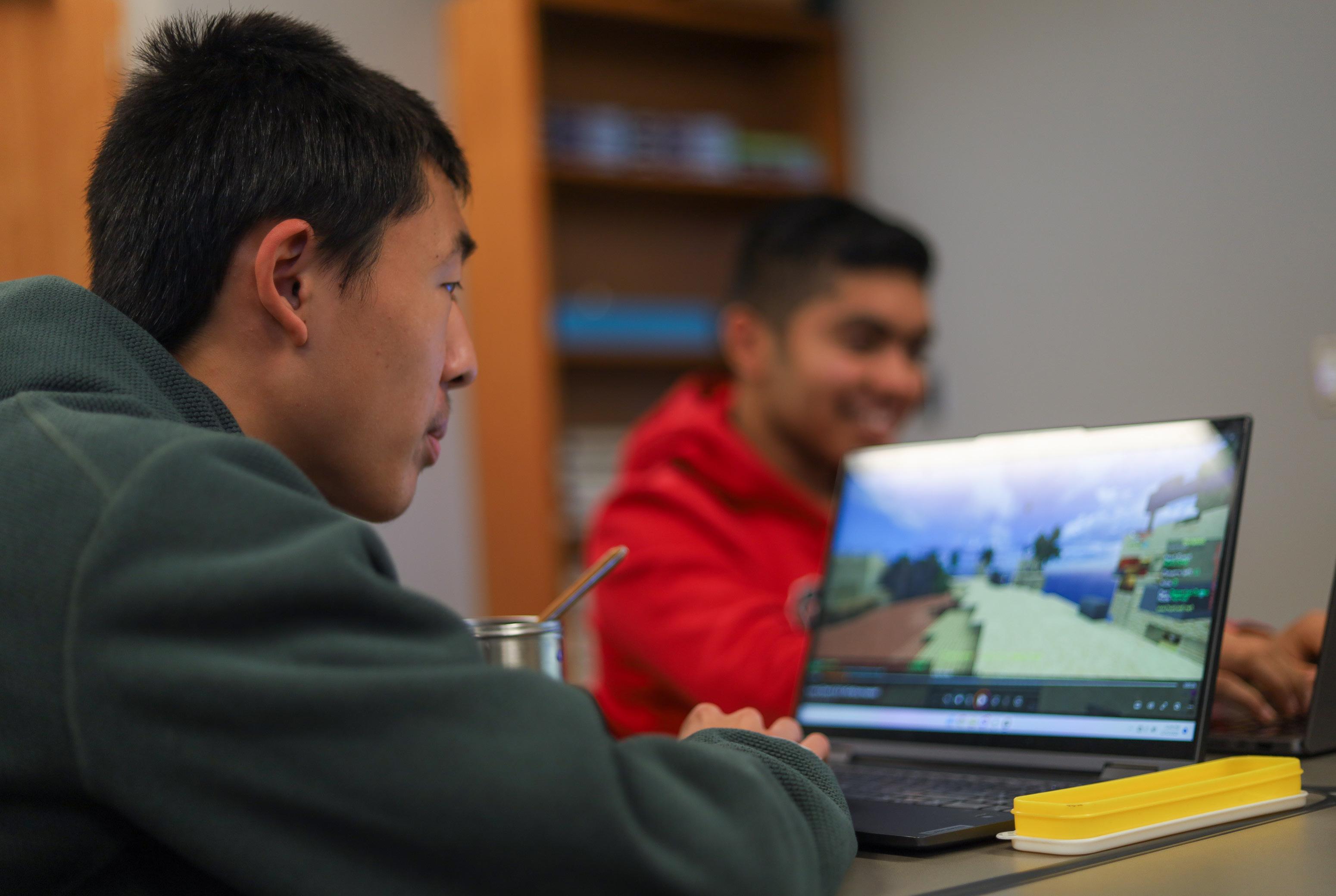 BY KRISH DEV AND STEPHANIE ZHANG
BY KRISH DEV AND STEPHANIE ZHANG
In his sophomore year, senior Jeremiah Moli’s friends decided to try playing Dungeons & Dragons (D&D), a popular fantasy tabletop roleplaying game. The game requires one player to be a Dungeon Master or DM and act as a storyteller for a campaign. Because of Moli’s creativity and the fact that he was willing to do the work to create a story, he decided to take up the mantle of a DM.
Since starting his first campaign in 2020, Moli has learned a lot about D&D and has organized many campaigns with groups of three to six people, with sessions taking place online via Discord on Fridays or Saturdays. Moli appreciates the
social aspect of D&D sessions, saying the game allows people to be more open with their personalities and get more comfortable with their friends. Personally, Moli finds that being the DM has given him a safe space to relax from academic pressure and process his thoughts.
“[Through D&D, I get to] express my creativity through storytelling,” Moli said. “It’s mostly just me saying things that are going on in my head, and I find it therapeutic because it’s just an endless stream of me talking things out. When I write the stories, sometimes they’re based on things in real life, so it helps to talk through my issues.”
As Moli and his friends have gotten a better understanding of D&D, his campaigns have become more complex, with one of his most recent campaigns being set in space. He likes how each campaign is unique and says he is excited to continue playing D&D even after he graduates.
“My friends are more comfortable with their characters and what they want to do [because] they knew a bit more about the game and what was in the realm of possibility for them,” Moli said. “When we started with sci-fi stuff, they found it cool [even though] it’s a lot different than what we were doing in the beginning. I think they all really enjoyed it.”
While Moli only started playing D&D two years ago, soccer has been a staple in sophomore Finnegan Hassy’s life since he was eight. After seeing a Premier League soccer game on the TV, Hassy got inspired to start playing the sport, and encouragement from his family led him to stick with it. Hassy says his father has always encouraged him to practice playing soccer and be active in general.
Hassy believes it has also helped him with his time management skills, as he has to juggle school, play for MVHS’s soccer team and play for De Anza Force, an outside-of-school club. With almost daily soccer practices and games, Hassy has learned a lot about time management in order to fit everything into his busy schedule.
“My time management skills have increased dramatically because of soccer,” Hassy said. “Soccer makes me [more aware] about homework and when I’m going to complete it. I usually like to do my homework beforehand, so I don’t have to worry about it when I’m at a soccer practice or at a game.”
Unlike Hassy, senior Jay Yeung, who makes gaming videos on YouTube, says he does not need to juggle his hobby and homework at the same time — when Yeung has a lot of homework, he takes a break from YouTube. While acknowledging that this causes his channel to have be inconsistent upload schedule, Yeung says his YouTube channel is just for fun and prioritizes school.
Yeung created his YouTube channel “Rukt XD” during his sophomore year, and started by posting Minecraft videos; however, recently he has begun diversifying his content with Valorant montages and ranting videos.
Admitting he has much to learn about editing, Yeung has asked his friends for help and joined Video Making Club at school. Yeung says he is motivated by positive comments on his videos, but the main reason he continues posting is a desire to be creative.
“Reading comments is fun, but [I upload to] create,” Yeung said. “If you’re always on YouTube and
consuming other people’s content, it gets kind of boring. Sometimes you want to create your own videos.”
On the other hand, freshman Sania Nadkarni prefers spending her free time with others and on weekends she likes to hang out with her friends. However, Nadkarni says because none of her friends can drive, they are usually limited to walking around, going to Jollyman Park or staying at one another’s houses.
“One time I went to [my friend’s] house, and we got Crumbl Cookies — we usually eat food [when hanging out],” Nadkarni said. “Sometimes we make TikToks, [but] a lot of the time we’re just in a room, and we’re all on our phones, but then we’re like, ‘We should go off our phones and just talk,’ so we then talk about people.”
Nadkarni balances her academics and social life by trying to finish her work on Friday. However, she says she is a big procrastinator and often leaves all her pending assignments for Sunday nights. Nadkarni says she can finish her work in one night because she has a light workload as a freshman but expects to have more work as a sophomore. Despite this, Nadkarni says she will still try to hang out weekly with her friends, as she says it helps her deal with stress from school.
“I’m going to try my best to [hang out every week], but I am gonna prioritize studying,” Nadkarni said. “But also, I think it’s important not only to study but also allow yourself time
to de-stress, and I think surrounding yourself with friends is a really great way to do that.”
Similarly, junior Jordan Tashjian thinks it is essential to make time to be social and says he has had to adjust his schedule to ensure that his weekly hangout with his friends on Saturdays doesn’t interfere with homework or family time. By getting most of his schoolwork done during the week, Tashjian says this allows him to not miss out on opportunities to be with his friends.
Tashjian says their weekly tradition of going to eat and then walking around only started this year, and he finds hanging out with each other outside of school on the weekends to be the highlight of his week and a welcome break from academics.
“[Our weekly hangouts] give me something to look forward to [and] I feel like, over this school year, I’ve gotten to know my friends better, and I’m closer with all of them,” Tashjian said.
I THINK IT’S IMPORTANT NOT ONLY TO STUDY BUT ALSO ALLOW YOURSELF TIME TO DE-STRESS.
FRESHMAN SANIA NADKARNI
Every year, two days before Christmas, sophomore Gehna Saini and her family hang up a golden reindeer ornament on their Christmas tree. The ornament, originally a present to her from her mother, consists of a reindeer head with a chained, string border around the bottom. After her mom told her the ornament brings good luck, it became Saini’s lucky charm.

“I think [that] the winter season is usually the time when I’m the most depressed because it’s just winter,” Saini said. “Putting [up] that golden reindeer makes me happy and it also brings good luck because final [grades] are coming.”
Saini’s family originally started the tradition when she was 5 years old. Since then, the role of hanging up the reindeer has been passed on from her mom, to Saini and finally to her younger sister.
English teacher Jireh Tanabe’s family has passed down a different tradition — they have gone to Lake Tahoe to ski every winter break since her kids were born. Tanabe says learning to ski is a skill that has been passed down from her father-in-law to her husband and his siblings and then to her kids.
traditional, cutesy winter during [the] Christmas season.”
Tanabe adds that another family holiday tradition of hers is stuffing stockings with presents the night of Christmas Eve after her kids go to bed. She mentions that “for the kids, this is about the magic of the season.”
Senior Brooke Frei also goes to Lake Tahoe over winter break, where she and her family celebrate Christmas by exchanging presents, having a festive dinner and enjoying nutmeg desserts and holiday cookies afterward. Frei treasures spending Christmases in Lake Tahoe because of how different they are from experiences at home.
“I like the white Christmas feeling of it,” Frei said. “In the Bay, you don’t get any snow — it feels like spring all year round. It’s really nice having a
“I think it’s neat to see how kids react to Santa Claus,” Tanabe said. “Having a mythical figure come, leave you gifts of your choice and then exit [your home] — there’s something magical about the anticipation, the expectation and the surprise because you’re not sure if it’ll actually happen, but every year it does. Of course, the kids are figuring out that Santa doesn’t actually exist, so the magic’s gonna be gone, but it’s having that in their childhood, I think, that’s magical.”
Overall, Tanabe stresses the importance of building relationships with relatives, adding that the holidays are a perfect time to do so.
“We go to my mother-in-law’s house for Christmas Eve and Christmas dinner so they can see all their cousins and so they can spend time with their family,” Tanabe said. “I think that part is invaluable as [the kids] grow up because it’s the relationships that we have with people that keep us a family.”
IT’S THE RELATIONSHIPS THAT WE HAVE WITH PEOPLE THAT KEEP US A FAMILY.
TANABEPHOTO | KRISH DEV
The moment her eyes began watering, she knew her allergies had kicked in. It was junior Jennifer Long’s first time at Mini Cat Town, a neonatal kitten shelter she had begun volunteering with, and due to her allergies, she was stuck behind the front desk welcoming guests for her first few shifts. Now, two years later, her allergies have dampened, and she looks forward to her bi-monthly three hour shifts at the shelter cleaning the pens and feeding the kittens.
“The first time I was there, I was literally dying, like mentally and physically,” Long said. “But then later on, I really enjoyed spending time with the cats — they’re tiny little creatures [and] are so cute.”
Long finds that the kittens provide her with a sense of companionship. Even though the kittens are often adopted quickly, she cherishes whatever time she has to spend with them. Playing and taking care of the kittens also distracts her from school and academics, especially after “failing a test,” creating a relaxing atmosphere for her to ground herself in.
“The friendships I’ve made [are] not only human friendships [but also] interactions with the kittens,” Long said. “If you hang out with the kittens so much, they form a little special bond with you.”
While Long uses community service as a way to destress, senior Ryan Hung leverages it as an opportunity to pursue what he is passionate about, teaching computer science at
underprivileged middle schools for his Boy Scouts Eagle Project. Although it was logistically challenging to transport volunteers and set up the class format, the first few classes went smoothly, with volunteers getting to know the students and tailoring their curriculum to what students wanted to learn.
Through this project, Hung has been able to help students develop their interest in computer science as well as his own. Over summer break, Hung recalls helping one of his students code their own version of Flappy Bird and guiding another student through the world of AI. Hung values doing something that he genuinely enjoys while also benefiting his community, finding that the project taught him a lot about organization and teaching.
“I got to learn a lot more about [the kids],” Hung said. “Helping them go through [the problems] reminded me of myself when I was learning [to code], and it felt good to be giving them the opportunity that they might not have had.”
Senior Iona Xia also finds community service rewarding, expressing how playing with the Polar Bears music group has expanded her perspective by allowing her to see “people who are often overlooked in society,”
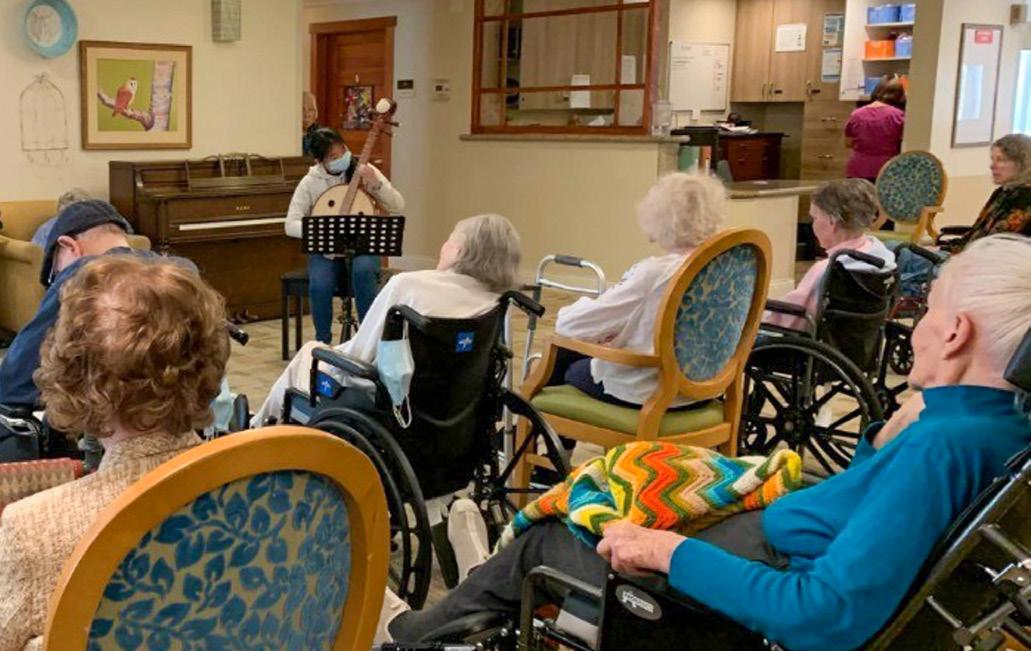
and giving her a chance to “embrace them and understand their point of view.” The music group performs at senior centers and homeless shelters twice a month, exhibiting a variety of instruments, including Xia’s specialties, ukulele, piano and the Chinese instrument, ruan, and ends every performance with the “Polar Bear Song.”
“When I get to go into a homeless [shelter] and I get to see what they’re going through every night, it really puts what I’m doing in perspective,” Xia said. “[We] perform music for them in order to let them know that they have a group of people supporting them and to help them feel more joy.”
Through their service, Long, Hung and Xia have found ways to use their unique talents and passions to help others. In the process, they say they have gained valuable skills and experiences that have enriched their lives.
“I think that service comes in a lot of forms,” Hung said. “Just being able to do any form of community service was really enlightening, and I encourage people to do more to do more kinds of community service.”
MVHS students share about the community service they do outside of school
SENIOR RYAN HUNGSenior Iona Xia performs the Ruan at a senior center PHOTO COURTESY OF IONA XIA
Senior Divya Venkataraman’s journey in speech started in sixth grade, when she joined Kennedy’s Speech team in hopes of becoming more outgoing. After joining, she was sure that she would continue doing speech in high school. Venkataraman’s journey with Monta Vista Speech has culminated in her being president in both her junior and senior years.
Other than speech, however, Venkataraman is an avid member of MV Res Novae, Future Practicing Physicians Network, Science National Honor Society, California Scholarship Federation and Science Olympiad. For Venkataraman, clubs are enjoyable.
“I feel like clubs are a big part of what I do [inside and outside of] my school life.” Venkataraman said. “I think the reason why I’m able to give so much time is because it doesn’t seem like too much of a job. Obviously
COURTESY OF DIVYA VENKATARAMAN | USED WITH PERMISSIONthere is a lot so it can get stressful, but it’s almost like a break from academic work working on speech, and I think that helps with time management.”
Venkataraman spends almost six hours a week on speech, whether it be for meetings, coaching at Kennedy Middle School or public relations meetings with administrators and advisors. Outside of these meetings, Venkataraman also spends time working on her own speeches, mentoring other members and organizing the logistics behind MV Speech. Similarly, senior Lara Vaidya, who is Vice President of Engineering for Monta Vista Robotics, says she puts in 10 to 20 hours of work every week for Robotics.
Every year, MV Robotics attends two regional competitions during the main season from January to March, and one or two competitions in the offseason. This season, MV Robotics
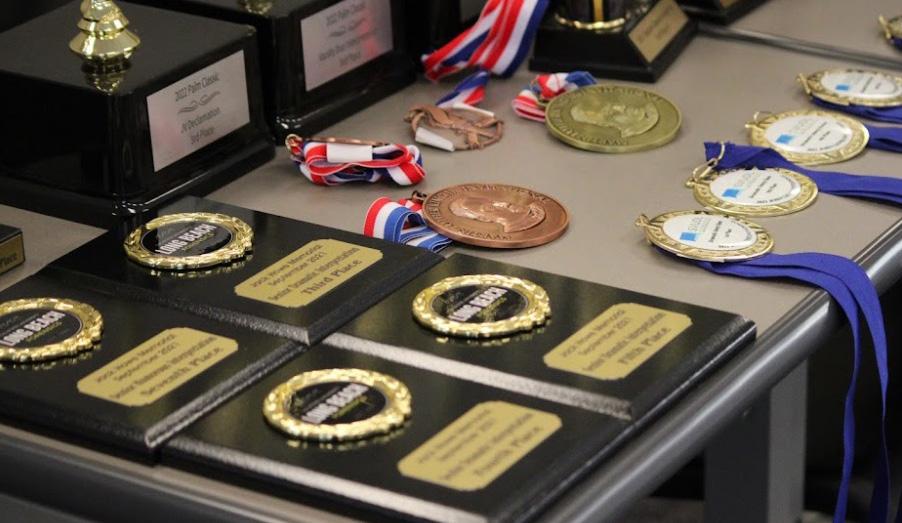
plans on attending two tournaments, one in San Francisco and another in Idaho.
Vaidya explains that the team is working to qualify for the FRC championships that are held in Houston, which she attended last year. Vaidya explains that at this competition, MV Robotics will compete against some of the best teams in the world, and the excitement and exhilaration she experienced in the competition last year were some of her most vivid memories with Robotics.
“We had a match and it was getting really close by the number— this was the match where we’d be qualifying to go play in the finals.” Vaidya said. “Just seeing [our robot] make its final shot pushed us over the edge to get the final point. Our whole team got up and cheered all together. It was just very daunting, it was so exciting. And we were all scared of what [would happen
if] we didn’t qualify but excited about what our robots could achieve.”

Venkataraman also fondly recalls previous speech tournaments where she not only competed, but spent time bonding and hanging out with her friends, and she is looking forward to competing in the tournaments that MV Speech plans to attend this year.
in the Berkeley region for three days. The friends that I made in my hotel room I’m still friends with and we still talk about some of those memories.
participating in competitions pays off in the form of memories and connections with his fellow peers.
DIVYA VENKATARAMAN SENIOR“One of my favorite memories [from speech] comes from ninth grade.” Venkataraman said. “It’s from the UC Berkeley speech tournament, and that’s an overnight tournament where we [stay in] a hotel
[I’m] definitely looking forward to [this tournament] in person this year as well.” Sophomore Jaden Bae is the current MV DECA Secretary/ treasurer, and he discovered his interest in management last year in his business class. His initial interest in joining DECA was prompted by the idea of expanding his knowledge in business and public speaking. Like both Venkataraman and Vaidya, Bae discovered that
“One thing that stuck out to me was the overall bonding that we have,” Bae said. “I spent way too much time playing [Super] Smash [Bros] and I slept at three a.m. once just because [of]how fun it was to be with my roommates.”
Bae’s experience in DECA had been greatly influenced by upperclassmen, and now that he is in a leadership role this year, he intends to spread his knowledge of networking and communication to others.
“I’m looking forward to sharing my experience with incoming freshmen and effectively communicate these methods to the next generation.” Bae said “Overall, I think Monta Vista has a long lasting legacy of competitive success when it comes down to the state and international levels. I want to keep this legacy going forward and teach as much as I can.”
SAT
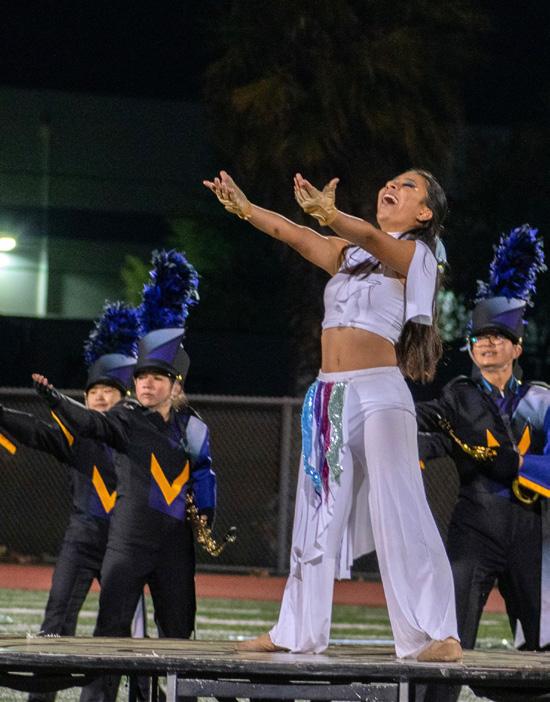
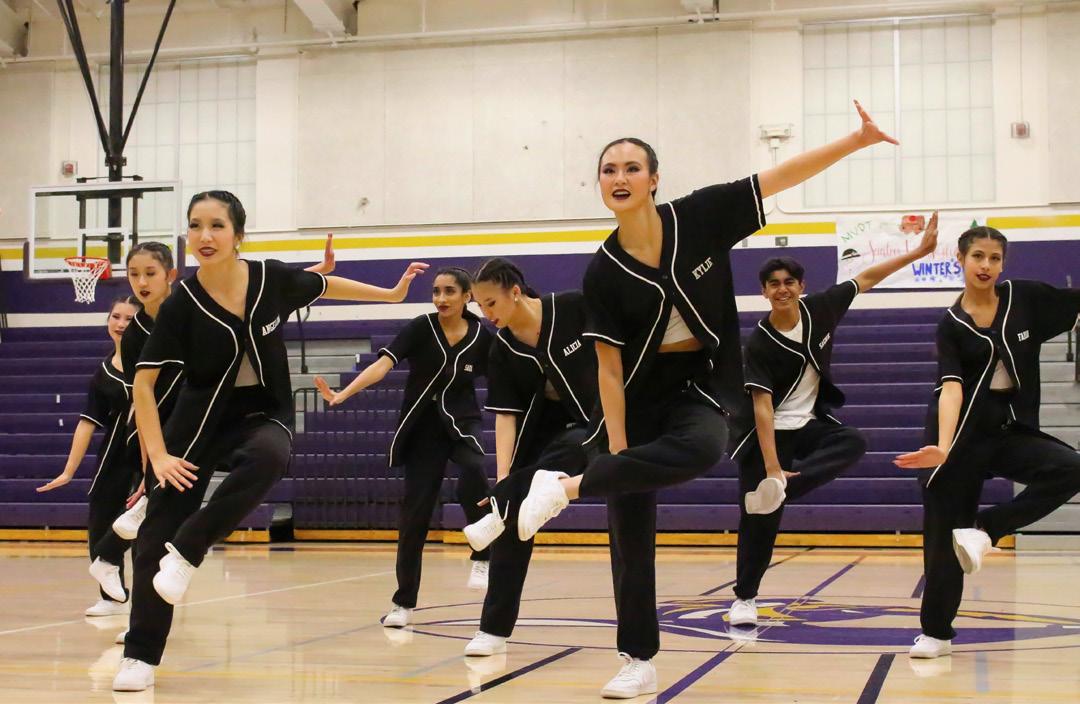








When Taylor Swift’s long-awaited “Eras Tour” inevitably sold out on its first day of pre-sale, we wondered how one woman had the power to sell out a 52-show concert in a matter of hours. With nearly 14 million people determined to score a ticket that day, it’s applaudable how many people in the country admire her, with nearly half the nation considering themselves Swifties.
insane amounts of money and a high social status. So when Swift, a selfproclaimed climate change activist, racks up nearly 170 flights in her private jet in just half of 2022, we begin to realize that perhaps we were never similar enough to be #besties.
As students, we love to call ourselves “stans” of these artists, dubbing Swift our greatest role model or constantly lauding Ye for being a musical genius. We skip school to fight for tickets to their shows and drop hundreds of dollars on merchandise to show our ardent support. But at some point, we must ask ourselves, how much do these celebrities really care about us?
As much as we’d love to be #besties with our favorite celebs, there is an obvious wall that separates us from their picturesque lives. Some of the pressing issues that we face in our daily lives — dealing with school, paying college tuition and having limited freedom — are absent from theirs, cushioned by their
And it’s not entirely our fault for glamorizing these celebrities, when the Vogue interviews and documentaries we spend hours binge-watching are all calculated PR moves that portray them as relatable and inspirational role models. This fabricated rendition of them successfully garners more support from us — average people who believe that perhaps one day we could become just like our perfect icons — when the truth is, we were never on the same playing field to begin with. All we’ve really managed to do is give more power to someone who already has more money than we will ever see in our lifetimes.
these celebrities, especially when they begin to misuse the power gifted to them by their fans. Ye will continue his anti-Semitic rampage as long as his stans continue to call him the greatest rapper in history. And Swift will continue to overuse her private jet as long as her fans continue to praise her for being the pinnacle of activism. We put more energy into these artists than they are giving back to us, and it’s only hurting our marginalized communities in the process.

Let’s be more aware of the wall that divides us from this unattainable superstar life. We don’t know these celebrities personally at all, beyond what is fed to us through the biased media. How can someone we barely know be our biggest role model? We have to watch the way we praise these artists and we must catch ourselves when we begin to justify their questionable actions because of their celebrity status.
This doesn’t mean we cannot keep enjoying their art or going to their concerts — their sheer talent is what created their career and built their ubiquitous names. But we must remember not to idolize their behavior and actions — these celebrities were never meant to be our heroes, or even our friends.
We are better off celebrating the people in our lives who teach us to become better every day, instead of these
know our names.
Arranged marriages, a term that invokes the image of child brides and dowries, may seem to be a foreign concept in the modern world. Yet, as with everything else, it has evolved to fit today’s society and is much more nuanced than it is often afforded.
The notion of arranged marriage is one that stretches back to the fourth century, and is traditionally defined as a predetermined marriage by parents or a third party. Though most prevalent in East Asian cultures, arranged marriages were typically seen as a way to maintain the position of upper caste families. Parents would write up what was essentially a resumé and matchmake for their children.
SREELEKHA MANOJParent Sreelekha Manoj says she had a typical, traditional arranged marriage. Originally from Kerala, Manoj’s husband’s family visited their home to see her, and after a brief 15-minute conversation, both families decided to continue with the process. After getting engaged a week later, the couple conversed through mail for six months before getting married on May 4, 1997.
However, although happy in her marriage currently Manoj criticizes the process for giving little freedom to women. According to Manoj, in South India, families pressure children to get married before 25, and finding jobs and obtaining an education are tasks to be done later on. Even if they don’t

Examining how the perception of arranged marriage has shifted from the past to present
perceptions remain negative. For want to get married, women often
THE CULTURE AND SOCIETY PRESSURE YOU TO KEEP QUIET BECAUSE THAT’S HOW CUSTOM WORKS.
they end pretty terribly for most people involved. Especially if you marry someone who’s a little cuckoo, and you just don’t know before.”
On the other hand, there have been many success stories within arranged marriages as well. Rahul Srinivasan and his wife Sumita Sami met through
marriage” — although their initial meeting was organized by their parents, the choice of whether or not to date and eventually marry was ultimately left up to the two of them.
Srinivasan and Sami’s story reflects the new direction in which arranged
He compares it to his experience with being vegetarian: in college, people would constantly ask him whether he ever missed hamburgers. In response, Srinivasan would ask them whether they ever missed rasam sadam, a classic South Indian dish. The answer to both would inevitably be no, because neither person had ever tasted the other dish before — and it’s hard to miss something when it’s “just not in your
According to Pathak, it’s important to keep in mind that arranged marriages are deeply rooted in tradition and communities, which are hard to change and speak out against. Pathak says her “entire family going back generations and generations is just arranged marriages,” and the idea of a love marriage seems almost unfathomable to her. Sami also highlights the difficulty of truthfully sharing one’s dislikes on dates, because there’s always the fear of “what will happen if people find out about some part of you that you don’t want them to find about, because it’s a
In the end, arranged marriages are still a divisive topic that continues to be debated. For some, like Sami and Srinivasan, it’s a story with a happy ending. For others, like Pathak, the concept feels outdated and unfair in the modern world. Ultimately, getting an arranged marriage is an option left open to those who wish to pursue it.
“Yeah, the tradition is there but I think that each generation has the ability to break the tradition,” Pathak said. “It just depends if they’re going

In the world of higher education, there are many different fields of study to choose from. Some students often decide on a “traditional” major, while others may opt for a more unique
discipline. However, there are often stigmas surrounding certain college majors, with some people believing that some majors are not as valuable or prominent as others. In this article,
students and alumni who have chosen unique college majors discuss their thoughts on the stigmas surrounding their chosen fields of study.
DAVID LUHaving had a passion for the environment since he was little, senior David Lu loved to take walks and spend time in his backyard. Once he reached high school, he decided to participate in an environmental protection summer program in Alaska.
“I went to Alaska with a group of students from [an outside organization] to study the effects of climate change on the environment,” Lu
environment. He believes the field is ever-changing, “and there are [many] exciting opportunities for innovation and problem-solving.”
Despite his passion for the field, Lu has faced challenges because of his major choice.
“There are still a lot of people who don’t fully understand the [importance of] environmental protection, [and] they sometimes dismiss it as a ‘less practical’ or ‘unimportant’ field,” Lu

Lu believes that societal pressure and a lack of support can make it difficult for some students to pursue their passions, especially if they are not in certain types of STEM fields. “The community we live in indirectly puts pressure on students: if you don’t pursue STEM, you’re not gonna have a good life,” Lu said.
Lu also believes that some students may feel pressure to pursue a certain
major because of their parents’ careers without fully considering their own interests and goals.
“In this community, many go into STEM only because their parents work in STEM,” Lu said. “How are we supposed to decide what to do? If it goes well, good for them, but if it doesn’t, it’s kind of too late. After four years, you’re stuck.”
Although he faced challenges, Lu’s passion for Environmental Engineering has not wavered and he remains determined to positively impact the environment, also encouraging others to follow their passions and not be limited by societal expectations.
[ABOVE] Joshi photographs a sea gooseberry on his trip to the Monterey Bay Aquarium.
[LEFT] Lu poses for a photo after white water rafting during his trip to Alaska.
[RIGHT] Salma Rezeik puts on makeup in a scene of Elhak’s film “Absentia,” where Elhak uses clip overlap to characterize the subject’s mind racing.

Ever since he was little, senior Shaunak Joshi has enjoyed marine biology. From watching David Attenborough documentaries to researching different fish species, Joshi’s passion for marine life
“As a kid, I used to love visiting the Monterey Bay Aquarium,” Joshi said. “I could probably identify [around] 30% [of the fish] and definitely all the sharks.”
So when the time to start thinking about college came around, Joshi was set on his choice of major — Marine/Aquatic Biology. However, when looking deeper into his major’s application process and career pathways of his major, he began to consider other options.
“I did consider [applying for] biology, microbiology, mostly because of the pay, but ultimately, I decided I’d rather be doing [marine biology] for somewhat less [pay] than other subjects for somewhat more[pay],” Joshi said.

niche major is pretty cool.” But outside of school, Joshi recalls moments when people treated him differently because of his major.
“Once at work, I [talked] with my supervisor about what major I’d be going into, and he started the conversation all happy and stuff. [He said,] ‘Oh, [what] are you majoring in?’ I said, ‘Bio.’ [He said,] ‘Do you [want to] be a doctor?’ and I said, ‘No,’” Joshi said. “And then you could see [his] smile start to go away [and] get replaced by a grimace as I went on.”
Joshi thinks that criticisms may have to do with the lack of diversity in the community. He believes students can get a well-rounded view of the world if schools implement courses of different varieties, especially in nonSTEM fields.
PHOTO BY SHAUNAK JOSHI | USED WITH PERMISSIONFinalizing his major after starting the application process, Joshi’s friends and family were supportive throughout his journey. At MVHS, he felt many were interested in his decision, saying that “people generally think having a
While many students enjoy watching films with friends, senior Rokiya Elhak has always been more interested in producing them. Directing and acting with her friends, she’d create short films to encompass any project ideas she had at the time.

“I started [a] YouTube channel, and I really got into editing,” Elhak said. “When I found out there [were] film classes [at De Anza], that’s when I was like, ‘This is a real thing. [Film is something] I can actually study, not just [a] hobby.’”
Throughout high school, Elhak was set on majoring in film. During the college application process, however, she began to receive feedback that caused her to think about her decision more carefully.
“My dad kind of started freaking out that I actually wanted to do film,” Elhak said. “He basically [was] second guessing my whole career.”
Elhak has also faced criticism from others who believe that a film career
PHOTO BY ROKIYA ELHAK | USED WITH PERMISSIONin the film industry. I know that [it’s] unconventional, [but] I’m fine with that.”
Lifelong California resident and junior Anika Karandikar remembers seeing California as the “best state on the planet” as a child. Now, witnessing inequality and a competitive culture in the area, Karandikar has gained a desire to leave, feeling “tired of the environment” she has grown up in.
In a phenomenon deemed the California exodus, 7.5 million people have moved from California to other states, leading to the slowest rates of growth ever recorded in the state, according to the Public Policy Institute of California. This trend reflects the feelings of many students at MVHS with 46% of students saying that they wish to move out of the state after graduation.

Along with Karandikar, freshman Varun Singh says his experiences learning about history and mythology, especially in school, have expanded his desire to encounter new experiences outside of the state.
“My family [immigrated] from India, and I [have] learned a lot of interesting stuff about India [in school],” Singh said. “There’s [also] Rome and Greece and the Mediterranean [which] has a lot of interesting history around it. The mythology around the Mediterranean — you could learn about that for days. I want to explore that. It’s encouraged me to branch out.”
challenges for many residents with the competitive culture, especially in the Bay Area. Sophomore Anushka Kumaran cites stress, such as at MVHS, and high taxes being the biggest problems of California living. Karandikar also says the high cost of living is an issue for her moving forward.
“If I am fresh out of college and I attempt to make a living here, it’s going to be very difficult given the housing prices and the rent,” Karandikar said. “The state is really expensive.”
her connect with others. Fam also describes herself as a “foodie” and says that the diversity in not just people but also cuisines has been one of her favorite things about the state.
Besides cultural diversity, Singh describes California as also having a diverse range of attractions like the Monterey Bay Aquarium. Kumaran agrees with this sentiment and says that national parks are some of her favorite places in the state.
While students like Karandikar and Singh wish to leave California, some students want to stay, feeling attached to the place where they have grown up. Kumaran acknowledges that California is often called a “bubble,” but believes that the state offers opportunities for connection through diversity.
wish to leave California after graduating from MVHS
*According to a survey of 153 people

“There’s so many people from different backgrounds and different cultures,” Kumaran said. “That’s been really cool — being able to connect with my culture and do things with people in my community. People call this area a little bubble, and maybe that’s why I’m kind of scared to leave it.”
Along with personal reasons, living in the state itself also poses
Freshman Arielle Fam agrees that diversity in California has helped
SINGH“Thinking about the state as a whole with nice national parks — we have Yosemite, we have Sequoia National Park,” Kumaran said. “Those are nice. I haven’t even been to [northern] parts or the super southern parts. So the state is so big that I haven’t even seen some parts yet, and I think those parts will definitely be very different too.”
Additionally, Karandikar says that the tolerance of Californians compared to other places like the Midwest is something that she will miss if she leaves.
“A lot of issues like LGBTQ rights [are] really tolerant in California,” Karandikar said. “A lot of other states don’t have the sort of protection on abortion and all the stuff that California does have.”
As students look beyond graduation, the academic and job opportunities available in the state are also a concern. California is known for prestigious universities and massive companies, and despite tech layoffs of

THERE’S SO MUCH MORE OUT THERE, AND I FEEL LIKE I’M NOT GETTING THAT HERE. VARUN
more than 45,000 workers in the Bay Area this year, Kumaran believes that California still has STEM opportunities that she wants to pursue. For Singh, however, these STEM opportunities are not as appealing, as he wishes to pursue something in writing or history.
“There’s not that many opportunities in those types of fields,” Singh said. “Everything’s more STEMbased. It’s like once people keep telling you, ‘Tech this, tech that’ — you kind of have enough at some point.


I know it’s an important part of the world, but there’s so much more out there, and I feel like I’m not getting that here.”
As Fam reflects on her future, she believes that she will pursue something like computer science and that she will stay in the state beyond college. She believes that California is the environment that she is most comfortable in and that even if she enjoys traveling to other places, California is “just better for living.”
“I’ll be trying to get into a university here in California, and then find a job here,” Fam said. “Whether it’s in this specific area or not might change, but I think generally, I’ll probably stay. Think about what you want for yourself and your future, and weigh your odds. How would staying in California affect that?”

Chandan and Diya.
As our parents told us about their lives before us, my brother and I sat in the back of an autorickshaw in India and laughed at our could-have-been names. I really cannot imagine our lives as Chandan and Diya — it feels odd to think about these two strangers, even though, technically, we’d be the exact same people. It’s Sid and Gauri, and that has always felt right.
Though I can’t help but wonder what life could have been if I was Diya Manoj right now. Perhaps I’d be more athletic, or a much better singer than I am right now (I am not a good singer). It’s crazy how much your name affects the trajectory of your life — I think that’s why famous people have some of the coolest names ever.
But I know that my name, Gauri, added some real conflict to my story. If I were Diya, I’d really miss constantly correcting my teachers or keeping an eye out for my drink before the Starbucks baristas absolutely butcher my name. I don’t think my parents ever predicted that G-A-U-R-I would be the most challenging sequence of letters for people in America.


For a long time, I never even bothered to correct people when they said my name wrong. I like to pronounce my name as gory, like a Quentin Tarantino movie, though instead of correcting people, I memorized every (often bizarre) rendition I encountered and just grew accustomed to the various things people would call me. I let people develop the strangest nicknames for me when these five letters were just
“too difficult” for them to pronounce.

I never thought it was anyone’s fault for mispronouncing or trying to change my name, because I knew it wasn’t that intuitive. I blamed myself more for letting people continue to mispronounce my name — it made me feel disassociated from myself whenever they called me a name that was not mine, like they were speaking to a stranger.
But as I grew older and my name became more important for credit cards, SATs or my driver’s license, I realized that I deserved to be recognized by the real name that my parents chose for me, and that was only going to happen if I taught others how to say it. Now, I’ll always tell the Starbucks baristas, “Gauri, G-A-UR-I,” with both the spelling and my pronunciation, even if that takes them a few tries to get right. We can always sacrifice a few seconds to respect and appreciate each others’ stories, and we can expect others to do the same for us.
We fear things that are unfamiliar to us and find ways to mold them into something we can understand. But there are some things we cannot shorten or Americanize without losing that sense of belonging. My name belongs to my family and my culture that they tried to preserve upon moving to America. And if I allow that name to transform into something that it was never meant to be, then it just feels like I belong nowhere.
I’ve learned that my name is more than just my signature, or an annoying tag on my shirt that I can’t seem to remove. It’s how I interact with the world and a testament to my parents who hand-picked it over my hundreds of other could-have-been names. And I am the only one with the ability to preserve its charm and significance, so I’ll stop letting it be overlooked by the people around me.
I’m not sure if my parents had any of this in mind when they named me, but I’m glad they skipped over Diya.

As I’m writing this, I have 101 celebrity men compiled and ranked in my “Notes” app in a document titled “celeb loves.” I first created the list on April 18, 2020, with a total of seven men, but has since, well, expanded a bit.

Not any man can be added to “celeb loves” — each new person must first pass these following criteria, and if successful, they will have the honor of joining the others.
1. Interesting personality outside from just their work
2. Impeccable sense of humor, preferably closely resembling my own
3. Kindness (more of an estimate)
4. Cuteness (generally means a good smile)
5. General un-problematicness and human decency
Clearly, the process is intricate. However, as much time, investment and joy I put into crafting “celeb loves,” I would never, ever, share the people on there with anyone — in fact, I’ve locked the note on my phone and constantly avoided discussion of the topic. Mostly, it’s because I’m embarrassed by the people on it.
However, several months ago, when word slipped out about my secret list to some of my friends, I was instantly met with shocked, excited questions as they insisted I show it to them. I agreed to play a game we called “Celebrity Roulette,” where I would let them choose any number from one to 53 (the number of celebrities on the list back then), and I would reveal that specific celebrity from my ranking on the list.
Glancing at my phone, scared of who I had listed at the chosen number
of 16, I paused. It was Fawad Khan, a South Asian actor who I was certain these friends hadn’t heard of. I’d always loved watching his movies and had added him to the list based on the criteria as usual, but saying his name out loud felt terrifying — I didn’t want them to judge my unconventional, somewhat age-inappropriate choice.
Ultimately saying his name, I wasn’t shocked by my friends’ confused faces, but rather by their interest in learning more about him. As I

pictures and described his career in the Indian and Pakistani film industry, they not only fully agreed with my taste, but also seemed surprised by my love of Bollywood which I had never publicized before.
My friends, interested in knowing who else was on the list, insisted on playing “Celebrity Roulette” again. As I announced Seth Meyers as #44 on the list, I was first met with shock, then laughter, and finally head nods of approval. Each time I listed a person, it turned into a conversation about my personal connection with each one, whether it was discovering them through a funny YouTube video or looking them up after hearing a song of theirs I loved. Each of the 101 men had a unique place in my heart.
Taking a closer look at my list, I discovered that it isn’t only filled with men that I find attractive. It’s a reflection of me and all the things I love. Stand up comedians, Broadway performers, musicians, Bollywood actors, I realized, were on the list because I share an appreciation for their specific craft. In
fact, l remembered that I didn’t title the list “celebrity crushes,” but rather “celeb loves,” because above all, I looked up to them as role models.
Instead of being embarrassed of the celebrity men that may lack mainstream appeal or conventional features, I started feeling proud of it and my ability to find beauty in the people who share my passions instead of loving just a pretty face (although that definitely earns points as well).
Now, talking about the sacred “celeb loves” has become one of my core personality traits, and I am incredibly excited for my passions to lead me to the next men to add to the 101 I already adore.

 BY SONIA VERMA
BY SONIA VERMA









“My brother gave me a pack of pens last year,” junior Esther Suh said. “[We] aren’t really that close, and he was like ‘Oh, I know you like drawing and I got this on Amazon after reading the reviews,’ and it was really sweet.”

“My dad’s friend gave me this keyboard,” freshman Ethan Yang said. “It was really nice because my old one was broken and the new one lets me type a lot faster, so now I can work a lot more efficiently.”
“This desk from IKEA,” senior Vidya Bharadwaj said. “I own a lot of stuff and have a small room, so it was hard to stay neat before. The desk is so nice and doesn’t look that big but it has so


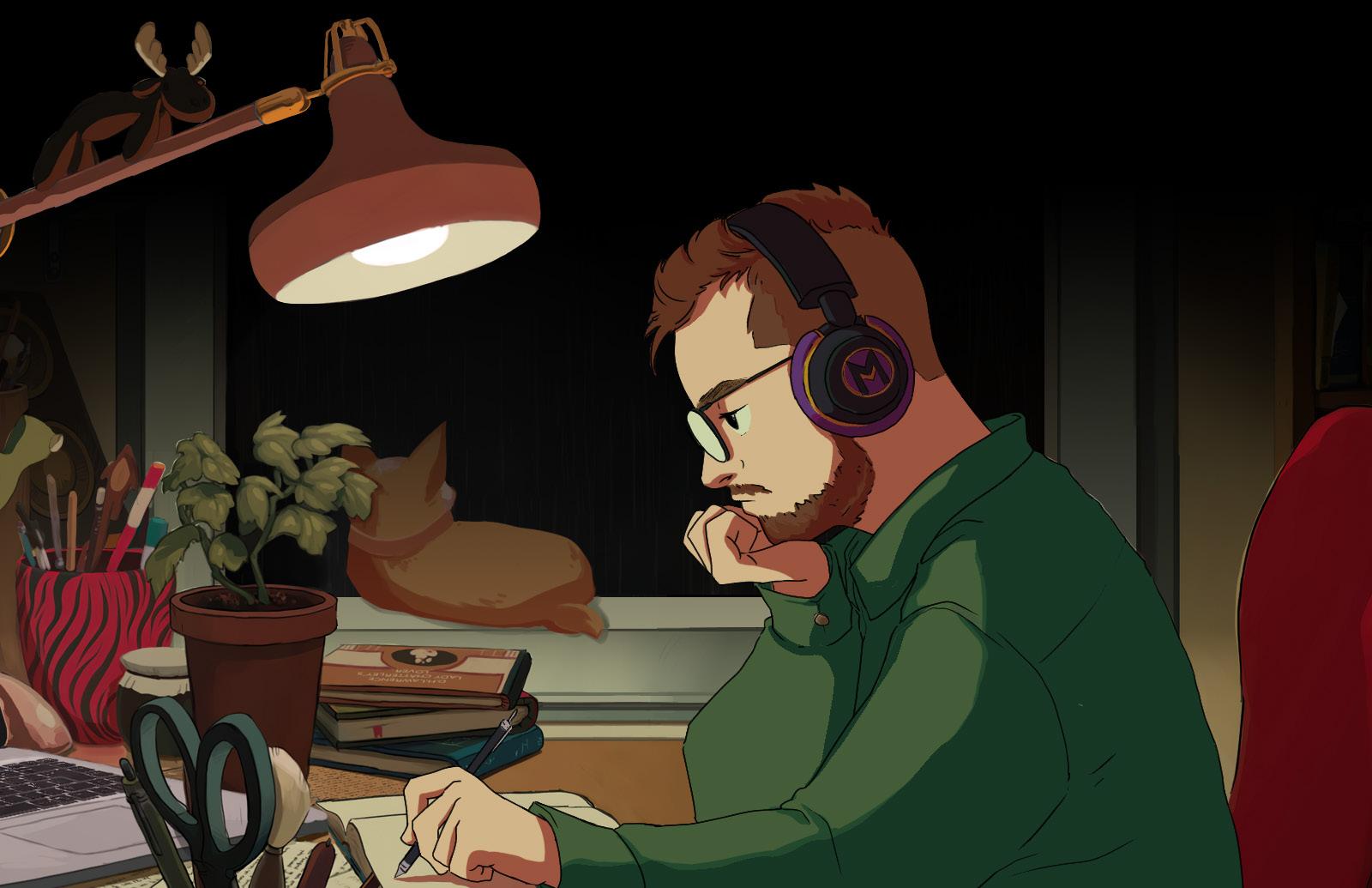

Renowned rapper Ye’s statements and actions in the past few months crossed the line in the hearts of many fans and critics around the world. After an initial controversy over a series of anti-semitic tweets in October, outrage erupted when he claimed in a now deleted tweet that he would go “DEFCON 3 on jewish people.”
Ye justifies his threats in the same tweet, stating, “The funny thing is I actually can’t be anti-semitic because black people are actually jew also you guys have toyed with me and tried to black ball anyone whoever opposes your agenda.”
Ye then dug himself deeper into controversy in December, stating in an interview that he “see[s] good things about [Adolf] Hitler,” and added “Every human being has something of value that they brought to the table, especially Hitler.”
After reading about how a group of people hung a banner on a Los Angeles Freeway that claimed “Kanye was right about the Jews,” senior Prerit Marwaha said that Ye’s statements are being used as an excuse for others to “come out of the woodwork” and reveal their own anti-semitism, enabling and giving a platform to anti-semitism.
Sophomore and Jewish Student Union President Erin Handelsman agrees, explaining that Ye’s large platform only exacerbates the existing anti-semitism in the U.S. Handelsman has seen others tweet in agreement with Ye’s statements, and she says his tweets foster a community where people can freely confess their antisemitic beliefs. She draws parallels between these growing acts and popularization of anti-semitism in the nation and the beginnings of the Holocaust.
“Look back to World War II, Hitler caused a big uprising and made people believe him and follow him,” Handelsman said. “And that’s kind of what Ye is doing — he stood out on his platform saying these antisemitic comments and now people are believing him and following him. I see a similarity between the two, and I don’t want what happened in World War I or World War II to happen today.”
Handelsman used to be an avid supporter of Ye’s music, especially his latest album “Donda,” and kept up with his life via his social media platforms. Now, however, she feels betrayed by his comments and tries to not show any support, whether that means ignoring his brazen tweets or turning his music off. Despite her own retirement as a fan, she acknowledges
how his music has been influential for some and she doesn’t mind if her friends continue to listen to it.
Senior George Gino usually adheres to this process of separating the art from the artist, but he says that this time Ye’s anti-semitism has gone too far, and he can no longer justify consuming any content or merchandise Ye releases.
While to some it seems harmless to keep listening to his music, Gino explains that even streaming Ye’s songs on Spotify and helping earn revenue only further enables him to continue spreading these hurtful messages, with more money to his brand and a strong fanbase.
“If someone you’ve loved and you’ve been listening to this entire time all of a sudden become[s] really controversial, it’s really hard to let go,” Gino said. “But I think it’s right, because in order to push away from them or kind of move away from them, you have to be able to stop listening to them and basically supporting them.”
Marwaha continues to listen to Ye’s music — though he agrees with Gino and admits it’s not the most ethical thing for him to do. For Marwaha, it is difficult to justify letting go of some of his all-time favorite songs, like Ye’s 2007 track “Flashing Lights,” citing the stark difference between Ye’s persona today and his persona 15 years ago.
October, Ye has seen a 20% decline in radio play, an MRC documentary scrapped and has lost ties with Balenciaga, Gap and Adidas. With the cancellation of these deals, Ye officially lost his billionaire status.

“If I did see someone wearing his GAP hoodie or recent shoes that he produced, then I would just feel ashamed because I don’t want people to be following him and supporting him like that,” Handelsman said. “I get Yeezys — they’re old and that was before he said all this. But [buying] his new stuff, it’s just like, ‘What are you doing? Come on.’” A majority of the MVHS community agrees with Handelsman’s sentiment. In a survey of 119 people, 75% of the respondents said that they do not believe it is OK to keep wearing or purchasing Ye’s merchandise.
of
“The music I listen to wasn’t created by current Kanye, the one that’s been exposed to new extreme ideas,” Marwaha said. “It was made by a previous one — somebody that was mourning the loss of his mother or celebrating his success.”
believe it is OK to continue listening to Ye’s music
*According to a survey of 111 people
Gino agrees, stating how the situation has escalated from a single controversy to “an unjustifiable mess.”
The Financial Times published an editorial calling for the removal of his music from major streaming platforms Apple Music and Spotify. Since
“In October I said [to] separate the art from the artist,” Gino said. “I still think that’s true, but not with [this] scenario right now. It’s just gone too far. And supporting him will just [make the] situation worse.”

Before every MVHS music concert, considerable preparation takes place for determining the song lineup. Soprano singer and senior Ambhranee Yakkundi has been in choir for all four years of high school, and has sung a large variety of songs. According to Yakkundi, one important value that choir considers when performing music is cultural diversity.
“Many of our songs are in different languages,” Yakkundi said. “We do a lot of African language songs. We do a lot of Latin songs … the feel of the song is very different with different language[s], so it just adds a change in the type of music I always sing.”
Vocal music director Amy Young adds that much of the historical music in choir involves religion, but many newer pieces are secular, including the folk songs from a variety of countries. As a result, the music in choir is influenced by both of these time periods.


However, finding songs from different cultures is just one part of the extensive process within deciding repertoire. When it comes to concerts centered around specific events like holidays, choir and instrumental music classes include music related to the event and feature music outside of the central theme. For the Winter Concert this year, Director of Instrumental Music John Gilchrist believes that using only Christmas music would be uninteresting. Young adds that the concert is called the “Winter Concert” instead of the “Holiday Concert” since not all their songs are holiday related.
On the other hand, the two classes differ when it comes to student suggestions. Yakkundi says Young is very open to what students want to sing. She says that this year, choir is singing more upbeat pop music than last year due to student requests.
For instrumental music classes, Wind Ensemble member and junior Oscar Wang says he thinks student suggestions have less influence. He enjoys playing the songs Gilchrist chooses, but Wang feels that students would be even more motivated if they were to play songs that they picked.

Gilchrist says that although he considers student suggestions, he is “rarely swayed” by them, especially when it comes to concerts.
“I want to be very meticulous about planning [concerts] out,” Gilchrist said. “I'm not to say that I'm the only one who knows what's best for the ensemble, but kind of like a doctor would prescribe a medication to a specific patient … you need to let the expert pick that out.”
However, Gilchrist says outside of concerts, song choice is more lenient. Wang agrees, providing songs played by the pep band at football games as an example.
“Marching Band has a lot more options for football game music,” Wang said. “If we give him suggestions for the songs played during football games, he would actually listen to the suggestions. I suggested ‘Super Idol’ once, and he actually did it.”
Overall, Gilchrist finds that choosing repertoire for his classes is fun and exciting. He sees it as one of the more interesting aspects of being a musical instructor.
“Whenever we perform or we sight read music for the first time, it's always kind of exciting, because there's this feeling of newness and not really knowing how it's going to sound,” Gilchrist said. “I definitely love to have those experiences with the students in all the classes. Solving that mystery of how the parts fit together is just so much fun, even if it can be a little stressful at times.”
According to Amy Young, this song, sang at choir’s Winter Concert on Dec. 16, was chosen since several students sang it in previous years, and wanted to bring back the song's positive
Played in Wind Ensemble's Dec. 15 Winter Concert, this was chosen by John Gilchrist due to it’s unique twist of using minor keys, making classic Christmas songs sound dark and eerie.



 BY ALYSSA YANG
BY ALYSSA YANG
Since their introduction via comic books in the 1930s, superhero characters and storylines have become one of America’s most popular forms of entertainment. Over time, their popularity has shifted to film and television in order to remain at the forefront of mainstream media, due to what writer Jed Mackay refers to as superhero stories’ “power fantasy” — the escapism which appeals to audiences en masse.
nuance in how superheroes are protrayed.
“Because [conventional superhero characters] have so much good in them and represent the best of people, they lack the other side of not so good characteristics,” Manoj said. “They’re good role models and examples for people. I just find it more interesting to see someone who has some flaws and isn’t 100% good.”
Moon Knight’s ambiguous nature as precisely what makes him such a good antihero. While her definition of a superhero is someone “willing to save others and put others’ needs first before they save themselves,” she doesn’t think antiheroes fall under the same category.

“Oftentimes we feel helpless about the things that happen,” Mackay, who is the author of Marvel’s latest serialization of the “Moon Knight” comics, said. “In the superhero world, eventually, things are gonna get fixed … things are brighter than bright — more colorful than colorful — and there’s a certain amount of hope [that the real world] could actually [reflect superhero media].”
JUNIORMackay agrees that heroes with flaws seem more realistic, noting that even characters like Moon Knight, who is severely mentally ill and carries a reputation of brutality, feel closer to audiences than their morally upright counterparts.
“If [Moon Knight’s] story was told in another perspective, he’d obviously be the villain … while antiheroes are doing the right thing, sometimes they do it in a conventionally wrong way,” Kavoori said. “I think [the definition of a hero] is changing. I don’t know if that’s a good or a bad thing, but it’s changing.”
That moralizing effect was precisely what audiences needed during the Great Depression. Nearly a century later, it still hasn’t lost its appeal, which junior Rishi Manoj attributes to superheroes becoming manifestations of ideal members of society. However, Manoj has also begun to look for more
“As real people, we’re stuck between Moon Knight and Captain America, but ultimately, it’s sometimes easier to relate to the guy who’s feeling bummed out, because that’s just who we are as human beings,” Mackay said. “It seems like the number one thing people reply to a Moon Knight post on Twitter with is, ‘He’s just like me FR.’ I [hope not]. I understand it’s a bit of a meme, but yikes.”
Junior Vedavi Kavoori sees
RISHI MANOJ
i just find it more interesting to see someone who has some flaws and isn’t 100% good.
While other students were discussing the meaning of “White Boy Shuffle” in her literature class on Nov. 15, senior Amrita Arun was desperately trying to purchase concert tickets on the Ticketmaster site. Having received a presale code for Taylor Swift’s “Eras Tour,” Arun was prepared to buy tickets at 10 a.m. However, when an influx of users without the code logged onto TicketMaster causing the site to crash, the time to purchase tickets was moved to the afternoon, and general sale tickets were canceled shortly after. Although Arun was able to buy tickets, she feels for those unable to do the same.
“Ticketmaster is a monopoly 100%,” Arun said. “I had to go to the post office after school; my phone battery was at 10% [while buying tickets]. Canceling the general sale [is] kind of evil.”
Concerts are a classic experience that many enjoy engaging in — from purchasing tickets to finally seeing

one’s favorite artists perform live. For Arun, hearing about her friends going to extravagant concerts like The Weeknd made her even more determined to convince her parents to let her see Taylor Swift, specifically because it would be her first concert, and it falls on her 18th birthday. However, her excitement was accompanied by a fear of certain concert behavior.

“One of the main factors that I looked into when buying tickets was the fact that [the venue of Levi’s Stadium] had seating because I did not feel comfortable going to a concert that [only had] standing room,” Arun said. “I think safety should be everyone’s number one concern. If you aren’t comfortable, don’t go at all.”
Unlike Arun, Social Studies teacher Scott Victorine has attended over 50 concerts, the last being in July of 2019. Victorine’s love for various music

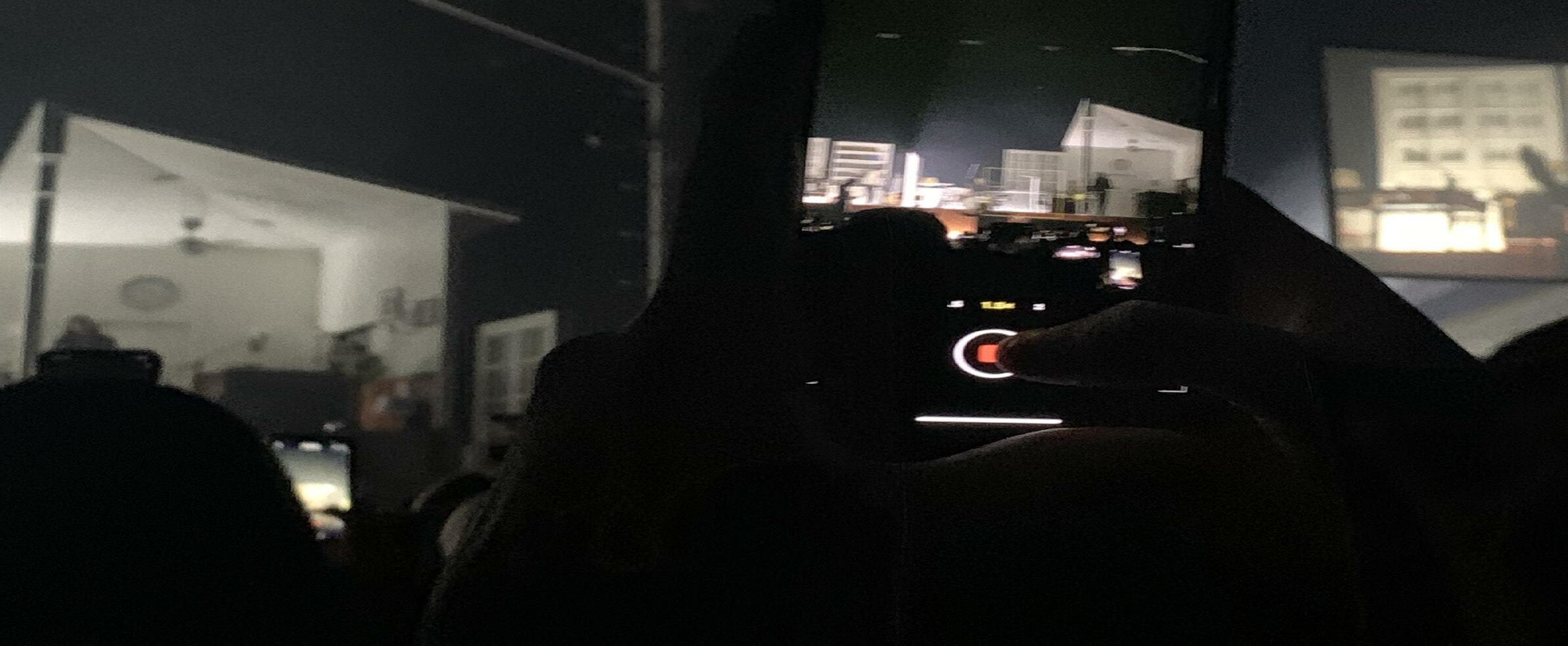
genres from alternative rock to jazz has led him to experience concerts in both loud, crowded venues and smaller, relaxed ones. However, he does share many of Arun’s concerns regarding the pits of concerts, specifically the rowdy behavior and engagement with substances like drugs, alcohol or cigarettes.
“Music does something within people and causes certain feelings,” Victorine said. “People react to music whether it’s being driven to tears at a concert or running around and getting amped up or [some] people feel the need to take a substance to make them feel a certain way. I think music just has that effect on people. To me, there’s nothing quite like live music — you can hear your favorite songs all the time, but when you see them performed live, it’s just so different.”
In fact, music’s exhilirating effect has influenced Victorine since he was 15 years old and attended his first concert without parents — Metallica, in San Francisco’s Cow Palace Theater. Victorine had been a large fan of Metallica for about a year before attending the concert with his friends, and the band’s unique punk rock sound inspired Victorine to begin playing guitar.
‘‘
ALL OF A SUDDEN THE LIGHTS GO OFF, THE MUSIC HITS, YOU’RE LIKE ‘OH WOW, THIS IS REALLY HAPPENING.’ TEACHER SCOTT VICTORINEPHOTO | STEPHANIE HSIA PHOTO | STEPHANIE HSIA PHOTO | CARA CONSTANT
“It was surreal at first because you see these musicians you look up to and you’ve watched [online] before, and now they’re right in front of you,” Victorine said. “So it was really overwhelming at first and just a lot of fun being on the floor. When the lights are on and you’re looking around the entire venue and then all of a sudden the lights go off and the music hits, you’re like, ‘Oh, wow, this is really happening.’”
While the appreciation for an artist’s music inspired Victorine to begin playing guitar, it inspired junior Sapphire Yang to create a social media fan account for their favorite music artists.
Although Yang created her fan account for artists Taylor Swift, SEVENTEEN, TXT, P1Harmony and Le Sserafim in 2019, it wasn’t until the peak of the pandemic that they began posting regularly. And while Yang has experienced toxicity with being in the online music fandom, especially with K-pop, she has also made deep friendships. Yang has met up with their long-distance online friends at concerts, and they plan to fly to Los Angeles to attend two Taylor Swift shows with their friend.
“With prices, we just try to get whatever we can, especially with Taylor.” Yang said. “If [Swift] has a concert, I will go no matter what it takes. When [Taylor Swift and SEVENTEEN] came on stage, I actually cried because I was like ‘Oh my God, these people are real.’”
For Yang, experiencing live music is a must, and they have attended eight concerts so far. Like Arun, Yang is not a fan of the preparation it takes to purchase tickets for high demand artists and “general admission” seating. Yang had to hide in a school bathroom while their friends were studying for final exams last year to purchase Olivia Rodrigo concert tickets, relying on the school’s Wi-Fi to beat the 2,000-person queue. When the concert date arrived, she stood outside the venue in a skirt during the
cold weather, hoping to get seats as close to Rodrigo as possible.
“I don’t think [artists] should do general admission because so much can happen,” Yang said. “People get injured, people can pass out. People want to be in front — they will do anything like camp out overnight and they can smell bad. At the Olivia Rodrigo show, someone passed out and fell on my feet and that really freaked me out.”

Like Yang, Victorine has witnessed dangerous behavior at the mosh pits of concerts. Specifically, while attempting to stop a fight between audience members at a Offspring concert in 2019, Victorine was assaulted, his tibia and fibula bones
breaking in the process. However, despite the disorderly behavior of concerts, Victorine loves sharing an intimate experience with others who enjoy the same music as him more than anything, and looks forward to attending concerts with his daughter one day. He encourages everyone, including his students, to be create memories through live music.
“You’re going to be tired the next day, but it’ll be worth it — you’ll never forget that day for the rest of your life,” Victorine said. “Take those chances [because] your classes will be there, your homework will be there. But [a concert is] an experience you don’t want to miss out on. Absolutely go — see the band, see the singer.”














You’re a skier! Whether on skis or on your own two feet, you manage to balance going fast and unrestrained with being steady.


You’re an ice skater! Graceful and elegant, you’re patient in mastering tricks and love to add your own spin to life.
You’re a snowboarder! Snowboarding is the more hip, older brother of skiing. You’re cool, calm, and collected, and it shows on the slopes.
















You’re a hockey player! Steadfast and determined, you’re willing to smash through obstacles to reach all your goals.

Entering the CCS finals game against Cupertino High School on Nov. 11, the Varsity Girls Tennis team had nothing to lose and everything to gain.


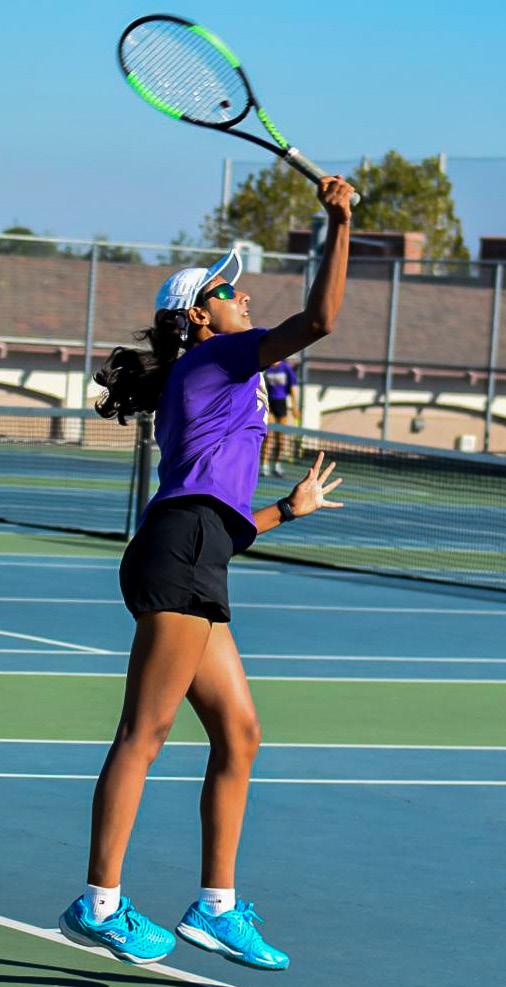
CHS was undefeated and favored to win — MVHS having already lost to them twice during the regular season — but MVHS soon went up 4-2, which assured them the win regardless of the outcome of the final match. The victory meant that MVHS, which had entered the CCS playoffs seeded seventh, had defeated the first, second and third seeded teams to win the CCS championships for the first time since 2013. For the players, it was a fitting pinnacle to a groundbreaking season.
“[Our win in the CCS finals] was really unexpected,” junior and captain Himani Jha said. “But we definitely played really well. We went into it with no pressure, so that also helped, whereas the other teams had a lot of pressure on them to beat us since they were the top seeds.”
The team faced many worthy opponents on its road to the CCS finals. MVHS narrowly defeated St. Francis High School 4-3 in the quarterfinals and Harker High School 5-2 in the semifinals, with the team’s hard work culminating in its underdog win against CHS in the finals. Qualifying for the NorCal playoffs after making it to the CCS finals, the team aimed to double its count of championship wins. On Nov. 18, the team played back-to-back playoff games against Lowell High School at 10 a.m. and Miramonte High School at 1 p.m., which MVHS won 7-0 and 4-3 respectively. This sent
the Girls Tennis team’s journey to winning CCS and becoming NorCal runners
the team to the NorCal regional finals the next day, scheduled against none other than CHS — but this time, MVHS was unable to bring it home, losing 5-2.
What made the team unique was its relative youth. In fact, it had the only fall sport roster at MVHS with no seniors, and the top two players were freshmen — twins Lelani and Zoe Laruelle — who eventually took second place in doubles in the 2022 CCS Individual Tennis Championships. Coach Gene Fortino, who was also chosen as the CCS De Anza League’s Coach of the Year, says that the low average age of the team was something unique to him in his 30 years of coaching tennis.
“It was an unbelievable season,” Fortino said. “It was just crazy, to not have any seniors, and that eight out of our starting 10 were freshmen and sophomores. I was just unbelievably proud of that. And I can’t say enough about our captains, the two juniors that were in the starting lineup, Himani Jha and Varshetha Senthilkumar. They were amazing captains all season long and really believed in the team. They were almost like the team moms.”
Sophomore Varsha Iyengar says the relative youth of the team “didn’t really affect the way [they] played,” but believes it will be beneficial to them next season, as they won’t be losing players and will instead just be gaining new ones. Iyengar believes
that despite not having everyone play in the same match, tennis is a very group-oriented sport due to the encouragement and motivation she and her teammates get from each other. Iyengar feels that since the team has gotten to bond throughout the season, not having to adjust to the loss of players will strengthen team camaraderie overall.
“It was pretty easy for us to bond together since we all have outgoing personalities and we’re willing to get to know each other,” Iyengar said. “We already got to know each other this year, [and we know how everyone plays], so we’re going to be even stronger next year.”
Sophomore Lucy Yung says that a major aspect of the team’s strategy that allowed it to win games was assigning players to different matches based on their strengths and the specific circumstances surrounding them. For example, she says her most gratifying match was her doubles win against CHS in the NorCal finals, in which Senthilkumar was her partner, even though Senthilkumar typically played singles.
“In other sports, I feel like you can’t put people interchangeably into different positions, [since] people specialize,” Yung said. “But for this match, we put [Senthilkumar] into doubles so that we could have a better chance of winning.”

According to Jha, the team didn’t
necessarily have any plans for huge victories going into the season, seeing as many of their players were not yet veterans in the high school tennis scene. However, looking ahead to the next season, Jha says that she has high hopes for the team’s ability to replicate the success it experienced this season.
“We’re really excited for next season because we all work really well together and we’ve all bonded a lot,” Jha said. “So it’s nice that we won’t lose anyone. I think [we] have a really good opportunity to perform well [and I’m] definitely looking forward to it.”
Fortino agrees, saying that although he believes that the expectation will be on MVHS to succeed as returning CCS champions, he thinks the team has high potential for success next year.
“Coming in as returning CCS champions, I think expectations are going to be a little higher and everyone will be kind of aiming for us a little bit,” Fortine said. “So we’re just gonna go again, try not to feel the pressure. but I think we’re going to come in with the unity that we built this year and everyone’s going to be a year older, and we’ll see what happens.” SCAN FOR MORE COVERAGE
HEAD COACH GENE FORTINO
“IT WAS AN UNBELIEVABLE SEASON. IT WAS JUST CRAZY, TO NOT HAVE ANY SENIORS, AND THAT EIGHT OUT OF OUR STARTING 10 WERE FRESHMEN AND SOPHOMORES. I WAS JUST UNBELIEVABLY PROUD OF THAT.”
what he describes as a crazy experience — witnessing thousands of fans from around the world gathered in a single stadium to watch the FIFA World Cup Qatar 2022.

“I remember seeing different sides of the stadium where there [were] fans from one country and then fans from another country,” Chaahoub said. “When I was at the Morocco game, I was able to go along with the chants because it was one of the teams I was supporting at the World Cup. It just felt like

This World Cup, Kathuria was rooting for both Brazil and Portugal, with a preference for Brazil because of “how connected [they are]” and how “they treat each other like family.” Meanwhile, senior Valentino De La Torre originally supported Mexico, his home country, but switched to Argentina because of its star player, Lionel Messi, after Mexico was eliminated in the group stage.
“Since I was a kid, I liked how [Messi] played, how he moved, how he shoots,” De La Torre said. “For a lot of important players, [it is] the last World Cup.”


players in order to win the game.”
Chaahoub grew up watching soccer clubs like Arsenal, Real Madrid and PSG with his dad and says that his familiarity with the players makes the World Cup even more exciting. With tickets to four group stage matches, Chaahoub flew to Doha with his dad and brother to attend a World Cup in person for the first time. The first FIFA World Cup that sophomore Siyona Kathuria watched was in
Chaahoub tried to keep up with most matches — especially Morocco’s, as he is half Moroccan — despite their times conflicting with school. He and Kathuria both watched highlights for games they missed. On the other hand, De La Torre sometimes watched the World Cup during class and says that while most teachers are fine with it, one teacher confiscated his phone while he was watching a game.
Chaahoub, Kathuria and De La Torre have found this World Cup full of surprises. De La Torre mentions that several “important teams” were eliminated early, while South Korea’s win against Portugal and the U.S. even making it to the World Cup were unexpected results to Kathuria. After

interesting World Cup because there [are a] lot of teams that you wouldn’t expect to [do well], but they've actually come out and beat top teams,” Kathuria said.








Kathuria finds that the World Cup has made her more passionate about soccer after she got back into the sport following a break, and enjoys “the environment and unity that it creates.” Chaahoub agrees, reflecting on the diversity of the soccer fans he saw while in Qatar.
“It's really cool [with there] being one place where everyone around the world just comes to watch soccer,” Chaahoub said. “There's such a variety of different people there. When I [went] on the metro, I [saw] people from Saudi Arabia, Spain, Canada, Brazil, Argentina [and] even India. I thought that was amazing.”
Argentina's Lionel Messi: "Been that way since I was 3 years old."

- Junior Shiven Bhatt
Croatia's [Luka] Modric: "Highly underrated midfielder." - Anonymous

Portugal's [Cristiano] Ronaldo: "I've been a fan since I was 9." - Anonymous

As someone who doesn’t wear flashy makeup regularly, typically only wearing eyeliner and mascara, junior Ashika Mittal enjoys being able to dress up for performances with her teammates on the MV Dance team. This year’s look, similar to previous years, was decided by the coach Katie Sullivan and includes foundation, concealer, blush, false eyelashes, and a signature red lip — Maybelline Super Stay Matte Ink in Shade 50 Voyager.


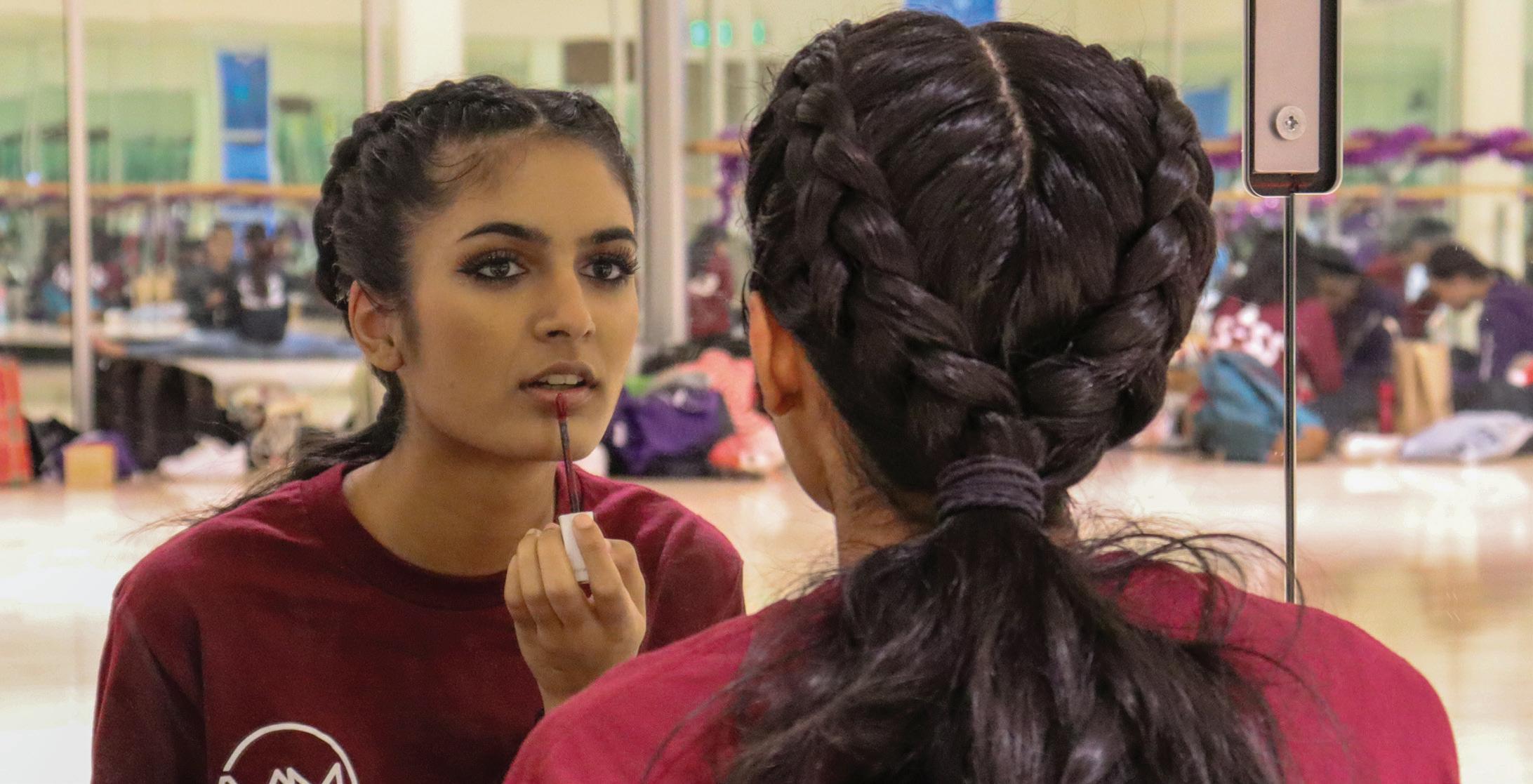

Even though dance members say they have grown familiar with the routine of applying makeup and could get ready very quickly if they wanted to, they usually dedicate an hour before performances to get ready together and use the time for team bonding.
“I’ve had some of the deepest conversations with the people on the dance team while getting ready,” Mittal said. “It’s a nice time to unwind, put makeup on [and] just talk with each other. Usually, we’re in a very fast paced environment — trying to dance and stretch and do all that stuff — [but] getting ready together is a time [to] talk to each other.”
Senior Joyce Lui carefully applies a row of silver stars underneath her eyes, the last step in her performance day makeup routine. During Color Guard’s fall season, the team explored a winter-like look with icy blues and silver glitter to match its “True North” theme.
To keep all members’ looks as uniform as possible, the Color Guard leadership, which Liu is part of, plans out a list of products for members to purchase from drugstores or Amazon to ensure they are affordable. The team’s makeup is usually very heavy, with vibrant colors and false eyelashes, which Lui says is especially helpful during fall shows when Guard performs on an outdoor field, with spectators in the bleachers far away.
“It’s hard to see everyone’s faces, so we have to have more dramatic makeup — jewels, liner, false lashes,” Lui said. “But in a more intimate setting, like [Winter Guard, which performs indoors], we still do [dramatic makeup] because it enhances facial expressions. We’re a performing art, so having that visual element adds a lot to a performance.”
Sophomore Zoe Bao gathers in the gym bathroom with the rest of the cheer team, the captains following behind with a speaker to blast music as the members get ready before the Monta Vista vs. Fremont football game half-time performance. Cheer team members had decided to place pink and yellow dots on their faces to match the game’s neon theme. As a teammate drew dots on Bao’s face, she says she felt closer to her team than ever.
“We have so much fun getting ready together, especially when doing those extra steps like drawing dots or painting numbers,” Bao said. “We get together 20 minutes before we’re actually supposed to meet up and do our makeup together.”
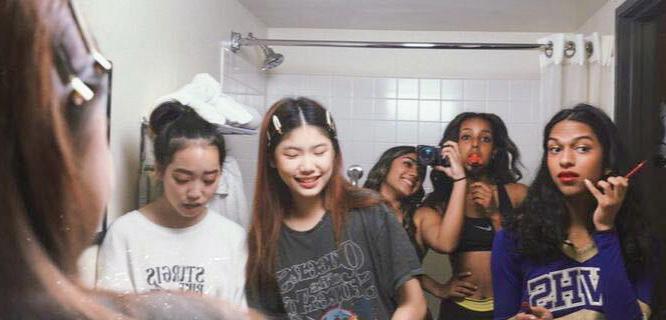
Cheer tends to have more dramatic looks — competition days feature dark eyeshadow, lashes and a bold red lipstick. Game days only have lip gloss, but always use gold eyeshadow for Matador spirit.
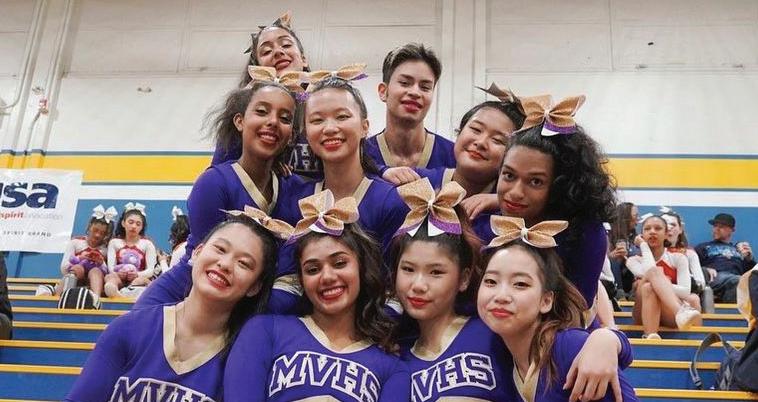
Bao also enjoys wearing makeup outside of cheer, although she usually goes for a neutral look rather than the striking cheer makeup that is intended to stand out.
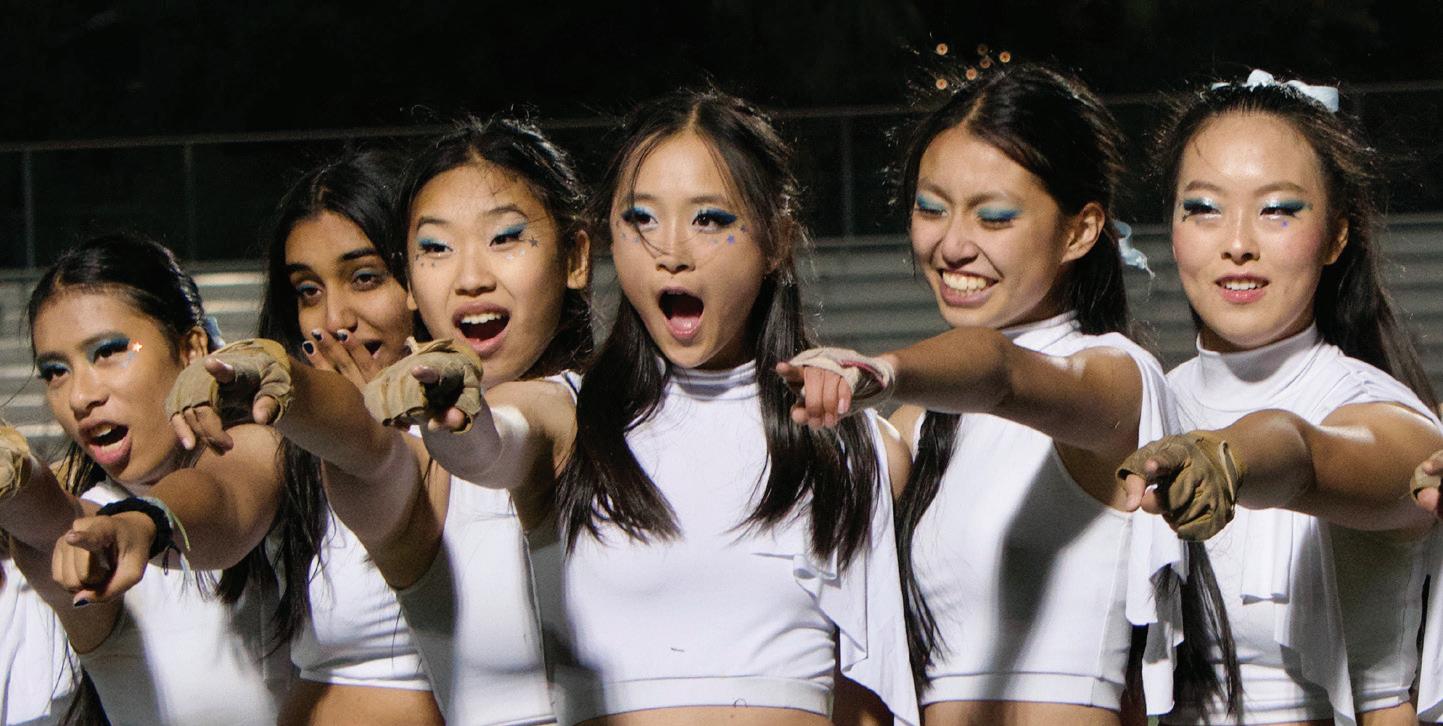

“It grabs [the] audience’s attention,” Bao said. “And for me, it makes [me] feel more confident. When people are looking at me, I can feel good about myself.”




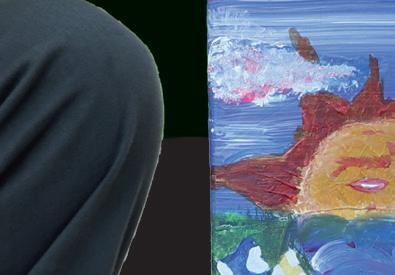








Junior Darya Pereverzeva gripped the pole on the sidewalk near her home, steadying herself on her RipStik before slowly letting go, allowing gravity to pull her down the road until she inevitably stopped and pulled herself back up to do it again. When she was 8 years old, Pereverzeva would go up and down the short road, finding joy in the moments of speeding down the slope.
This hobby evolved alongside her — to the Penny Board when the RipStik fell out of style and eventually to the skateboard she




uses today.




“As I was penny boarding along




the road, I saw a skateboard
on the side of the road that was all rusty and old,” Pereverzeva said. “I took it in and repaired it with my friends. It’s still old, but it has new wheels, and it has a little bit of a vintage touch to it.”
The process of learning how to skate was a bumpy road as she learned both from her friends and on her own. Pereverzeva reminisced on those times, grateful that she stuck with the hobby.






“A lot of it was trial and error while wearing sturdy helmets and knee and elbow protection and falling a bunch,” Pereverzeva said. “But I did it anyway — I would just see how far I can go, and eventually, with enough practice and muscle memory, [I got] the hang of it.”
For her, skateboarding provides an escape from the real world, a way to leave her problems behind and feel the wind in her hair as she speeds down the road.
“I do like to [skate] at night sometimes with some music and maybe the beautiful night sky,” Pereverzeva said. “It just makes you feel very magical — you’re enjoying the breeze of the wind, and you’re connected with yourself and everything around you.”

Stuck at home and with little to do during quarantine, sophomore Aster Nguyen took his free time as an opportunity to learn how to skateboard. After watching an anime called “Skate the Infinity,” Nguyen and some of his friends decided to take it up together because it seemed fun.

While Nguyen enjoys skateboarding, he finds that certain stereotypes about the sport and community end up dissuading potential skateboarders. For Nguyen, one of the more harmful stereotypes in the community is that of “skater boys” — rude, rebellious skaters who paint both skaters and the sport as unwelcoming.

“It discourages people from skating,” Nguyen said. “Why would you want to skate if everyone



in the community is a bunch of douchebags?”
These stereotypes didn’t dissuade Nguyen from learning, however. His friend created a spreadsheet of tutorial videos on how to skateboard, and Nguyen managed to teach himself the sport.
just





